
ISSUE 14 | JAN 2023
Unveiling the Mystery of the Human Brain Women’s SelfObjectification in Competition Finding an EQ Equilibrium In Dialogue with a Humanist Technologist
Creating an Age-Friendly Smart City
Linguistics
Social Policy & Administration Communication & Media Studies
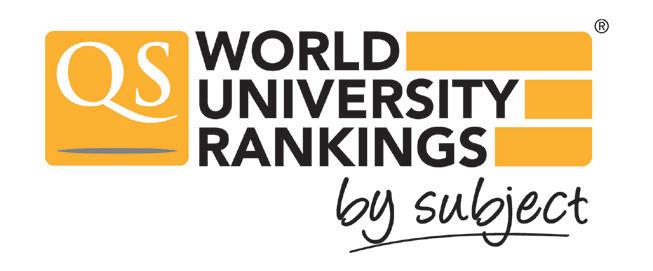
QS WORLD UNIVERSITY RANKINGS BY SUBJECT 2022
Department of Chinese and History Department of English Department of Linguistics and Translation
Department of Media and Communication Department of Public and International Affairs Department of Social and Behavioural Sciences
Chan Feng Men-ling Chan Shuk-lin Language Centre
Centre for Public Affairs and Law Centre for Communication Research Centre for East Asian and Comparative Philosophy Southeast Asia Research Centre The Halliday Centre for Intelligent Applications of Language Studies
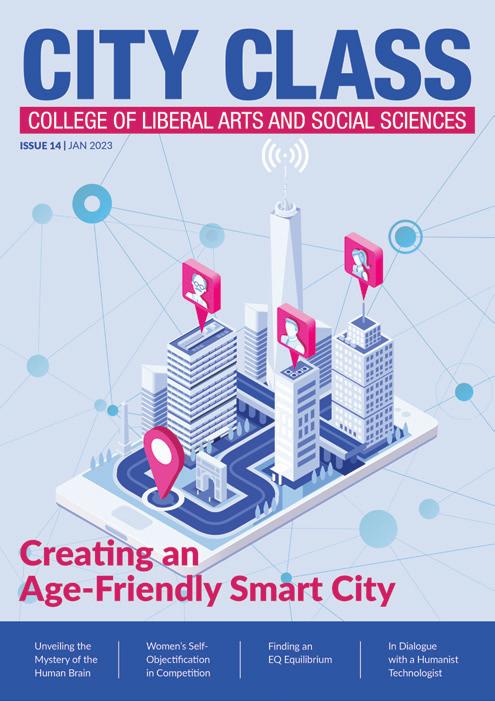
12
16
21
23
SOCIAL IMPACT 24 Simplicity Speaks
EVENTS 28 CLASS
New
of
30 Reaping the
& LEARNING 32 Empowering
34 Learning Without
& ALUMNI 36 Finding an EQ
40 New
41 New
Information
42
43
FEATURE 04 Getting Older, Getting Over: Creating an Age-Friendly Smart City PEOPLE
Lending a Hand to Restore the City’s Prosperity
Unveiling the Mystery of the Human Brain for AI Advancements RESEARCH 20 Sex is Power: Women’s Self-Objectification in Competition
Feeding on Fancies During China’s Great Famine 22 How Information on SNSs Influences Our Impression Formation
Multimodal Construction of Interculturality in YouTube Videos
Sagacity
Advanced Methods School Ushers Scholars into a
Era
Research
Harvest from the Grand Tours TEACHING
Students with Timely Academic English Support
Satiety STUDENTS
Equilibrium NEWS
CLASS Department Builds Greater Synergy
Research Cluster Links Neuroscience and
Technologies
Illuminate the Life of a Lighthouse Keeper –“Lighthouses: Paradise Beyond the City”
Taster Lectures for Tomorrow’s Talent
ISSUE 14 | JAN 2023
Getting Older, Getting Over: Creating an Age-Friendly Smart City

An ageing population undoubtedly poses problems for society. However, an elderly person’s twilight years can still be active with better digital and social inclusiveness in society
Growing old is an inevitable part of life. Thanks to modern medicine, people are living longer and healthier lives.
According to the World Health Organisation (WHO), one in six people globally will be over the age of 60 by 2030, up from 1 billion in 2020 to 1.4 billion. By 2050, this number is expected to more than double to 2.1 billion.
Life expectancy in Hong Kong has surpassed that of Japan’s to become among the highest in the world. Figures from 2021 showed that Hong Kong men can expect to live an average of 83.2 years, while women’s life expectancy is a whopping 87.9 years, according to the Department of Health at the Centre for Health Protection.
Census data published in 2022 noted that the proportion of
4 CITY CLASS | ISSUE 14 FEATURE
persons aged 65 and over in the population has risen to 20 per cent in 2021. For those aged 85 years and above, the proportion has reached 16 per cent, and is expected to surpass 30 per cent by 2066. In other words, almost one in three people will be aged 85 or above then.
While this is good news from a health perspective, from a social governance point of view these developments will pose significant challenges regarding how to help the elderly live better and increase their quality of life following retirement.
Blueprint for a Better City
In 2017, the Hong Kong government rolled out a Smart City Blueprint for Hong Kong that aimed to develop digital infrastructure to help residents in their daily lives.

In 2020, in the midst of the COVID-19 pandemic, a Smart City Blueprint 2.0 was released with 130 further initiatives to be implemented. The intention was that these initiatives would help support Hong Kong to become a more age-friendly city.
“Simply put, creating an age-friendly city is about creating more opportunities for people of all ages to participate and actively foster their health and wellbeing,” explains Dr Tracy LU Shiyu, Assistant Professor at the Department of Social and Behavioural Sciences at City University of Hong Kong (CityU).
Lu stresses that an age-friendly smart city is really more about being inclusive while emphasising the humanistic spirit and taking a people-centric approach.
“It’s about using smart technology to make the city more inclusive,” she says.
And her peers couldn’t agree more. Dr CHAN Ho-mun, Associate Professor at the Department of Public and International Affairs, says that in his view, an age-friendly smart city is really one that is data enabled, digitally connected and uses AI technology to help older people receive their healthcare, social welfare and other necessary services.
“This is particularly important because many older people prefer to stay home instead of in an institution and it is better for them to be supported by a smart system,” he says.
At present Chan is collaborating with CityU’s School of Law on establishing a cross-border medical data exchange framework between Hong Kong and Greater Bay Area (GBA) cities. Many elderly people may prefer to stay in the GBA or travel frequently across the region after they retire; Chan thinks a strong digital connection with Hong Kong is essential to improve the continuity of healthcare wherever they are. For example, extending the coverage of the Electronic Health Record Sharing System (eHealth) in Hong Kong to healthcare providers and professionals in the GBA, so that health records can be accessible by healthcare practitioners across the GBA.
ISSUE 14 | CITY CLASS 5 FEATURE
Valuing the Old More
While the above may sound like a straightforward outcome, there are in fact a host of challenges that need to be addressed.
Both Lu and Chan agree that one of the key issues is the prevailing attitude and mindset towards the aged in Hong Kong. “Rather than seeing them as an asset, they are often regarded as objects needing to be cared for, and passive welfare recipients, when that is so often not the case,” Lu adds.
These days, most people in their 60s and early 70s remain healthy, and are educated and experienced. Many have valuable skills and learnings, and what is important is creating a friendly environment so that these people can continue to participate and contribute to society, explains Chan.
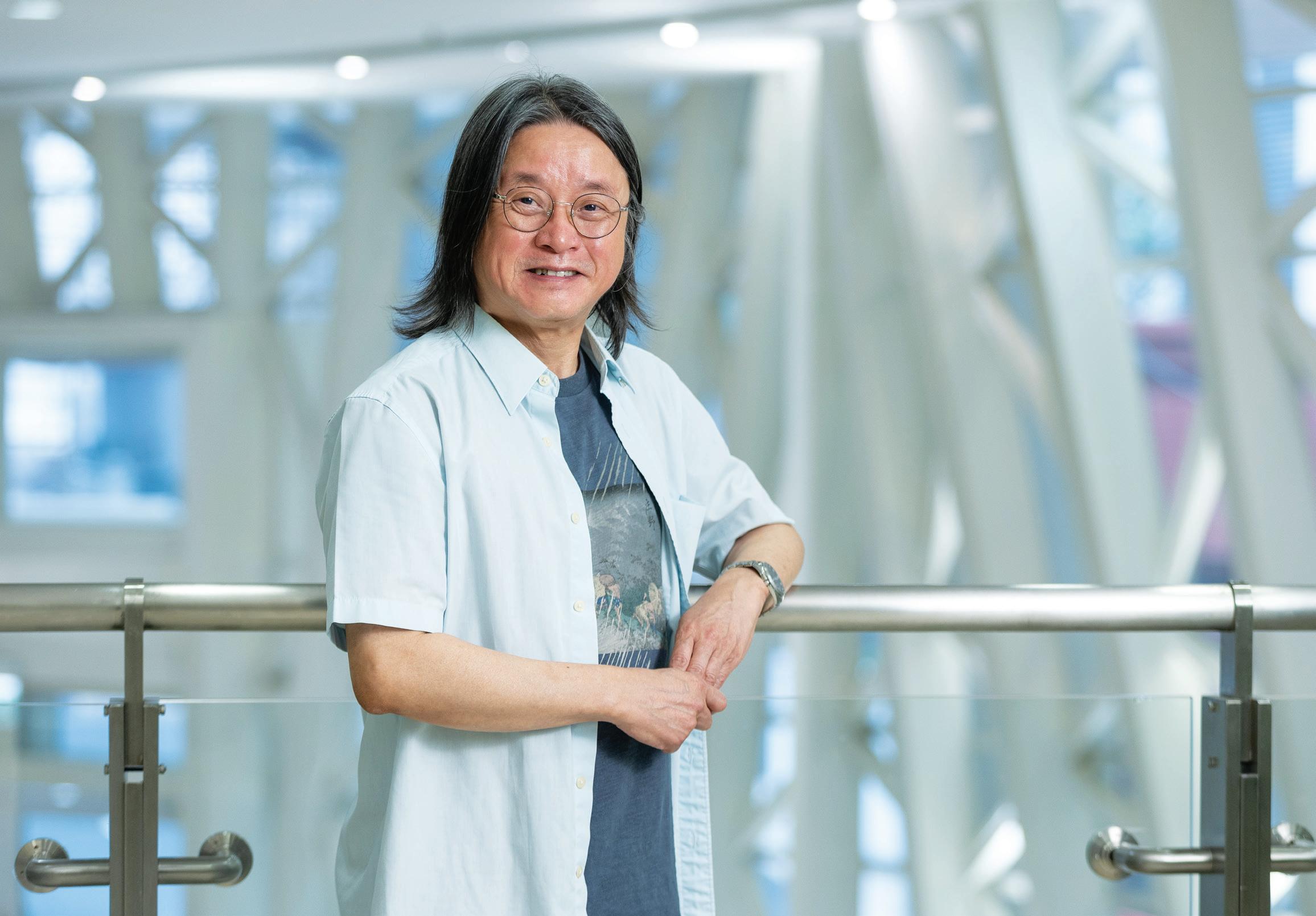
“It doesn’t mean we push them back to work, but if we have the capacity, we should facilitate them to make a contribution,” he says.
Building Tech Literacy Among the Elderly
Another major challenge in building an age-friendly smart city is the use of the technology itself. While there are obvious benefits to being connected and being online, if the technology itself creates barriers, then it could further fuel feelings of loneliness and isolation.
In fact, Chan argues that the technology itself can create inequitable solutions. “For example, smartphones—many people cannot buy one or don’t know how to use one properly. Yet if we live in a society that entirely depends on technology, those who don’t have that sort of access will be ignored,” he says.
6 CITY CLASS | ISSUE 14 FEATURE
Chan hopes Hong Kong can create a friendly environment that enables more of the elderly to continue to contribute to society.
Dr
Another major challenge is the technological literacy of older people.
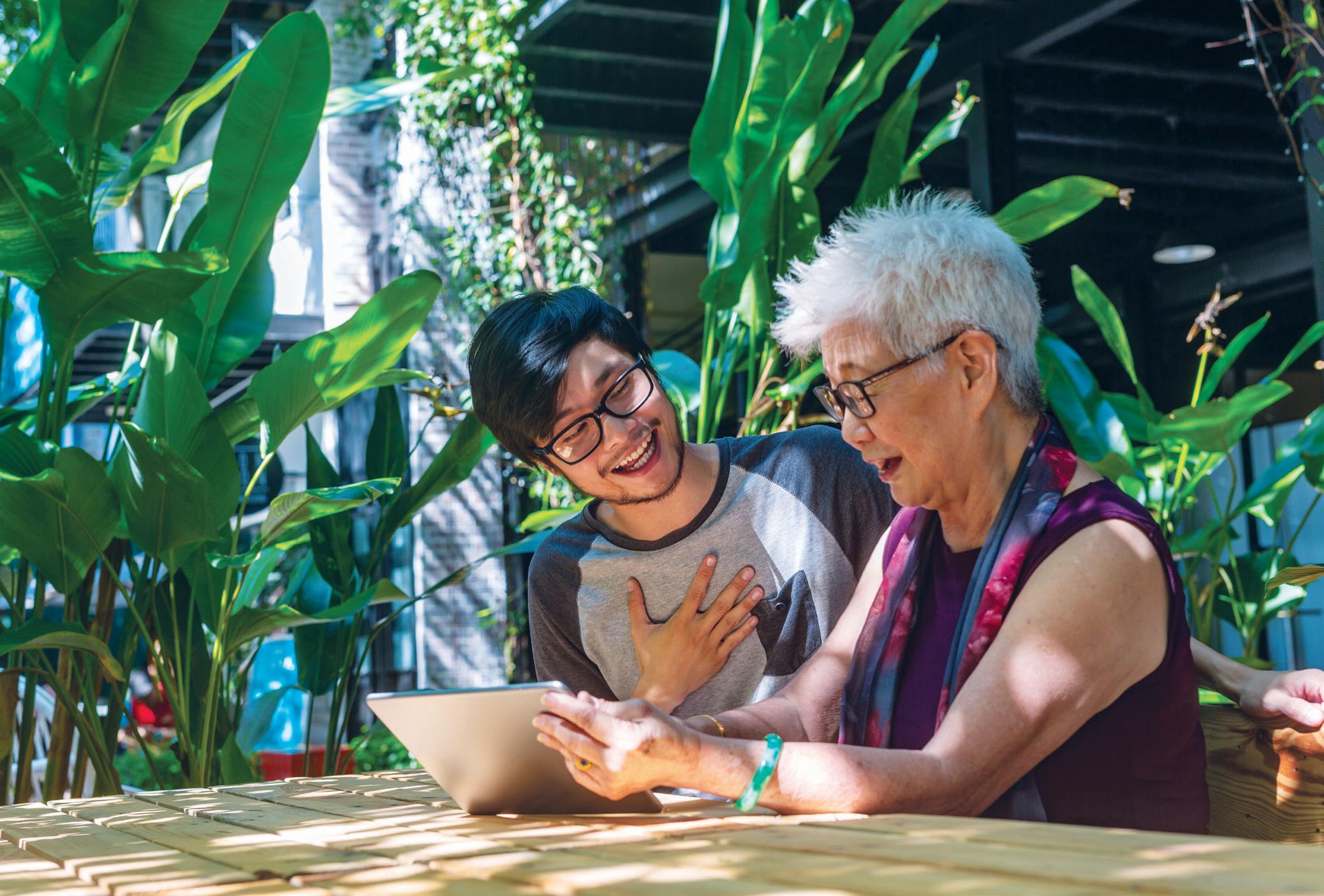
Dr Dannii YEUNG, Associate Professor of Psychology at the Department of Social and Behavioral Sciences at CityU, observed and witnessed the alienating effects of the technology itself during the COVID pandemic.
“During the pandemic we had social distancing and many of the elderly had to reduce their typical social participation with family members and friends,” she notes. “They couldn’t go to community centres to attend social activities, classes or workshops.”
The lack of ICT knowledge means that many among the elderly do not know how to use the internet or social media to connect with others, while some might not even have a data plan to get access to timely information about COVID-19 restrictions. Added to that, the introduction of the LeaveHomeSafe app also posed many challenges to the elderly in Hong Kong.
It is important to build tech literacy among the elderly and scholars advocate improving ICT education and knowledge as a start.
ISSUE 14 | CITY CLASS 7 FEATURE
Many older people prefer to stay home instead of at an institution and it is better for them to be supported by a smart system
Chan Ho-mun
“Their limited knowledge of ICT was one thing, and then there was the issue that many of them don’t even have a smartphone and/or a data plan,” says Yeung, noting that when the LeaveHomeSafe app was introduced, many elderly were completely helpless.

“They were standing outside the wet market trying to get help from people to teach them how to install apps and operate the smartphone,” she notes. “That sort of measure when implemented within society has limited consensus. The government isn’t necessarily aware that the potentially poor technological knowledge of older people—especially among those with lower educational levels, or who live in poverty, or don’t have smartphones—can put them in a helpless situation.”
For this reason, both Chan and Yeung advocate more education around ICT knowledge as a start. And in fact, Chan argues that it’s important that everyone in society plays a part in this.
“We need to press all the right buttons, the University, healthcare providers, the welfare associations and different stakeholders. They should all open themselves up for adopting new technology,” he says.
8 CITY CLASS | ISSUE 14 FEATURE
The lack of ICT knowledge means that many elderly do not know how to use the internet or social media, hindering their connectivity to others.
Elderly people’s limited knowledge of ICT was one thing, and then there was the issue that many of them don’t even have a smartphone and/ or a data plan
Dr Dannii Yeung
Motivation to Stay Connected
During the pandemic, Yeung’s team noted an appreciable rise in elderly people feeling excluded and isolated. For this reason, she feels that there is still a long way to go before Hong Kong can claim to have developed an age-friendly smart city.
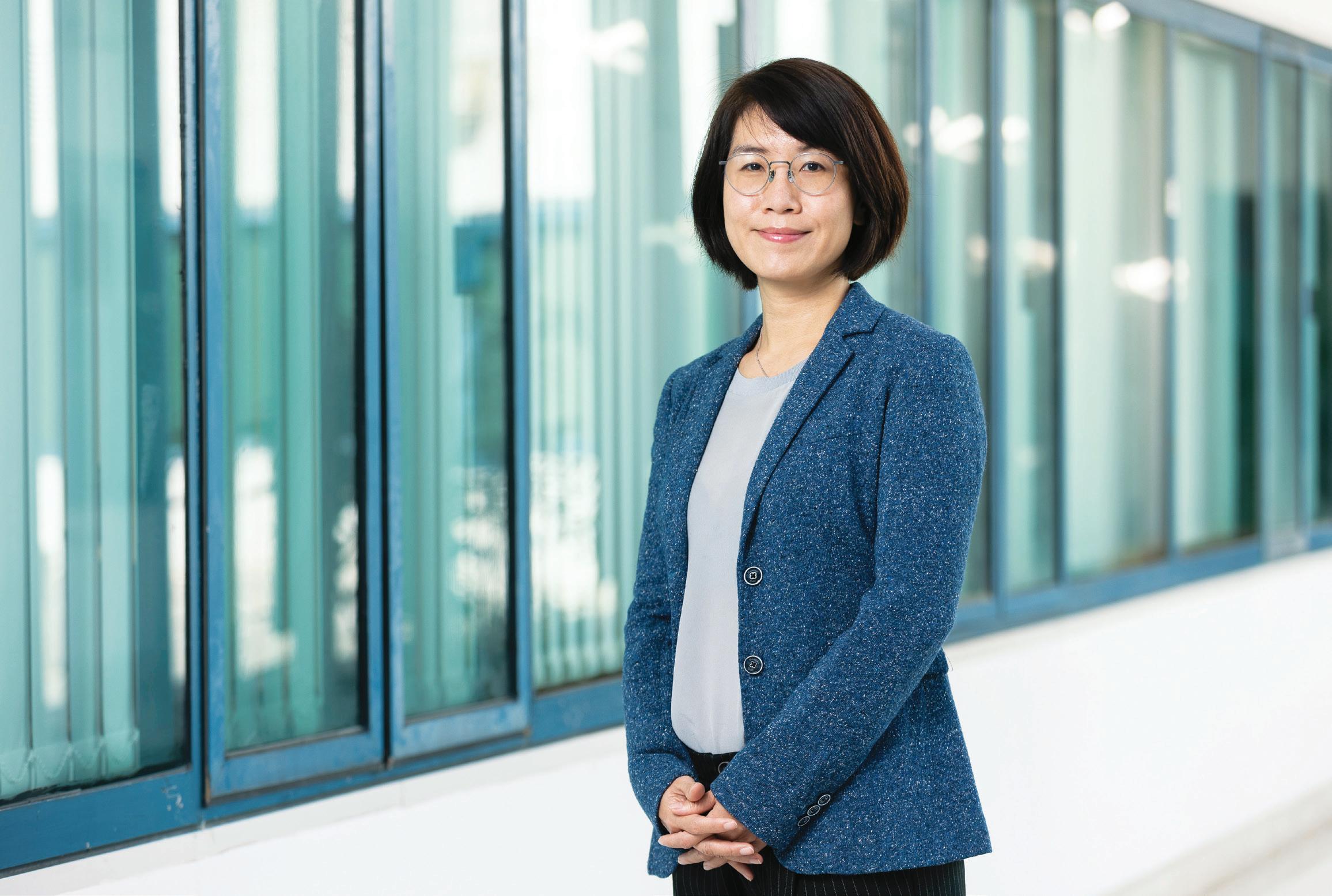
On the upside, there are currently many supportive groups, such as the Social Welfare Department and NGOs who have been providing active community care and support services to the elderly. Researchers are also playing a part in developing intervention programmes that help the elderly prepare for a more technologically driven society.
Yeung’s team and her collaborators have developed intervention programmes that cover mindfulness, behavioural activation and befriending programmes for reducing loneliness of elderly living alone, which are conducted over the phone so the elderly can stay home and still get support from trained volunteers. Yeung believes this is really the way to go.
“If we can develop intervention programmes on technology use that are not just focused on new knowledge acquisition, such as to frame them as learning these skills for having a better opportunity to get updates about their family members and friends, or even their grandchildren, through Facebook or having an Instagram account. This will motivate them more,” she says.
Indeed, looking after mental health and keeping the elderly motivated with social activities is important in old age and promoting emotionally meaningful goals is the key. Yeung explains why: “When we get older, we want to maximise our experiences and feel more rewarded and satisfied in our activities, contrasting that with knowledge acquisition goals when we are young.”
Lu adds that emotional meaningfulness is a crucial way to encourage older adults to engage in social participation which is important for creating a sense of belonging and self-importance, which are all important for social capital.
ISSUE 14 | CITY CLASS 9 FEATURE
Yeung and her team have been developing innovative programmes to help the elderly avoid social isolation.
And technology can play a huge part in this endeavour. In fact, Lu is an active researcher of the time bank model, a system that encourages older adults to do more volunteering and peer-to-peer interaction with a focus on rewards.
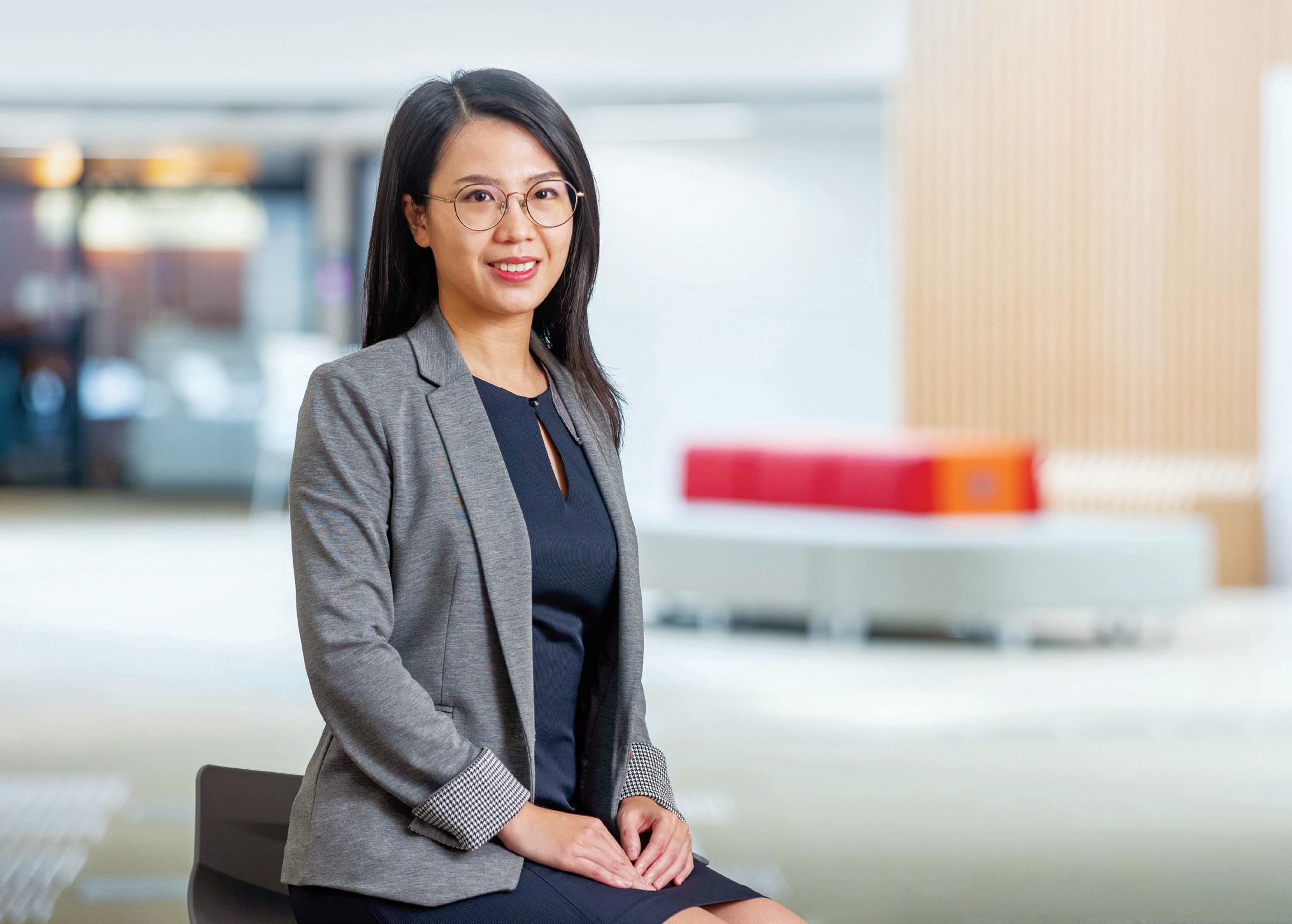
A reward can be time credits from volunteer hours that they can exchange for a service, or use to buy products from a social enterprise. But the critical component within the social capital framework is that it co-opts older adults to be co-producers of community development, which leads to inclusiveness, a caring economy and a more equitable society, explains Lu.
And technology today can play a key part in building this. Lu and her team use an app to promote volunteering opportunities and information relating to the opportunities and rewards gained from
the social exchange time banking programme. While the app itself sometimes poses its own challenges, Lu believes this is the best way to actually scale up time banks.
“To overcome our challenges, therefore, we need to make sure the elderly are co-producers and are key stakeholders when we improve the design of the technology,” she says. “That’s why we always ask for their feedback and seek to understand their needs before we improve the technology.”
Aside from co-producing the technology, Chan also believes that to turn Hong Kong into an age-friendly smart city, tech development needs to be even more targeted at the elderly.
“This is particularly important because many older people need better support through a SMART system,” he says, citing examples such
10 CITY CLASS | ISSUE 14 FEATURE
Lu says social participation is important for creating a sense of belonging and self-importance among the elderly.
as technology for rehabilitation, using robotics to solve any manpower problems or even having sufficient hospital beds and equipment to improve the quality of care services provided by institutions.
“If we can keep them in a data-enabled and digitally connected system, it would even allow them to pass away more peacefully and with dignity,” comments Chan when addressing end of life issues.
As such, there are clear benefits for Hong Kong to make use of technology to improve the well-being of older adults. And the three professors are optimistic about the city transitioning into an agefriendly city in the future.
“Although we still cannot see large-scale mutual help happening in the community level, different sectors are making efforts on their own,” says Lu. “A mechanism to allow for cross-sector collaboration is needed to scale up mutual help in our society—and this is the direction we should all move towards.”
Emotional meaningfulness is crucial to encourage older adults to engage in social participation.

ISSUE 14 | CITY CLASS 11 FEATURE
Creating an age-friendly city is about creating more opportunities for people of all ages to participate and actively foster their health and wellbeing
Dr Tracy Lu Shiyu
Despite a background in economics and business administration, George is excited about assisting the public sector.
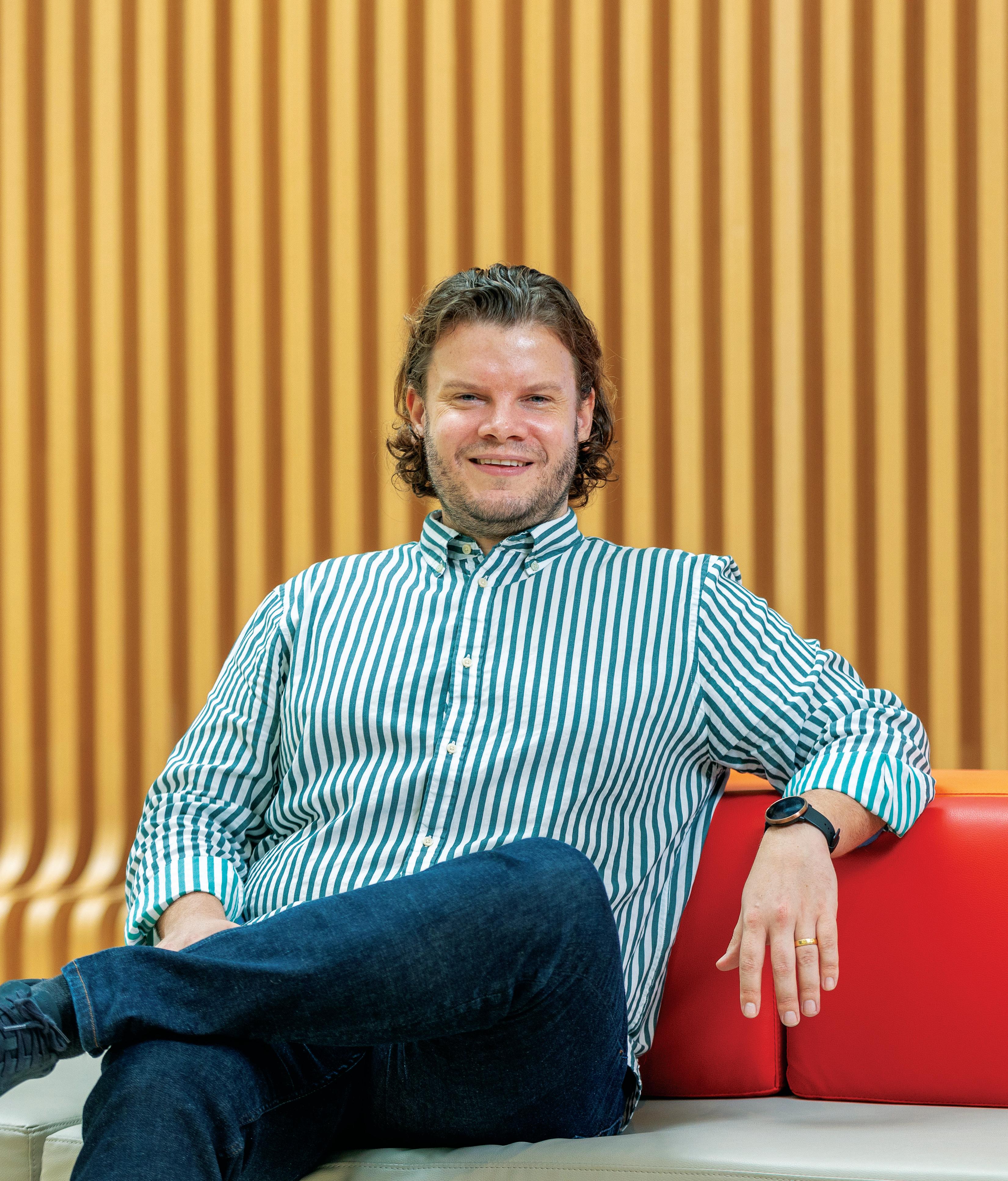
12 CITY CLASS | ISSUE 14 PEOPLE
Lending a Hand to Restore the City’s Prosperity
Dr Bert GEORGE is passionate about using his global experience and extensive research in public sector strategy to help the city reboot
Aglance at Dr Bert GEORGE’s academic qualifications and you would half expect to meet an economist-cum-business entrepreneur, yet the moment he walks into a room to talk about his research into public administration, his passion and enthusiasm light up the place.
“It doesn’t seem obvious when you look at my background in business administration and economics and now in public administration,” says the Associate Professor at the Department of Public and International Affairs of CityU. “It’s not a usual route, but it was a question of my own purpose and what I wanted to achieve in life.”

ISSUE 14 | CITY CLASS 13 PEOPLE
George received a BSc in Business Administration, then an MSc in Strategic Management, and finally did his PhD in Applied Economics at the Ghent University in Belgium. And it was during his earlier BA studies that he was drawn to the social side of his studies, taking a keen interest in public economics, the business of government and international organisations. Finally, it was during his first public administration conference when the penny dropped and he realised what he wanted to do, which was to effect change and make his mark in the field of public administration.
“They were talking about public value, being more responsive and collaborative as public organisations and being more equitable, and this was inspiring and pushed me into this field—I was just so inspired by the purpose of making society better and helping public organisations tackle big challenges and create value for their service users,” he beams.
George has travelled the world, advising public organisations and international bodies. His research interests can be structured into two areas: the processes and behaviour underlying public sector strategy, and the drivers and characteristics of public sector performance.
Good Timing to Rebuild the City
Having only recently moved to Hong Kong, George is visibly impressed and passionate about the city he now calls home. From the MTR system, the strong sense of community, and the world-class museums, to the efficiency of tax services, he continuously praises what Hong Kong has to offer its residents and the world. For this reason, he wants to contribute and help the city hit a reset button following more than three tumultuous years.
“Since coming here, there has been a restart, and we can see a lot of people becoming excited again, so we see a lot of opportunities and this is crucial. We need to put the past behind us and rebuild Hong Kong to be the Pearl of the Orient and Asia’s Global City,” he says.
He adds that he spends much of his time focused on thinking about how his research could help Hong Kong move forward.
“That’s a great deal of my ambition and one of my main focus points has always been strategy, which centres on establishing a shared and inclusive vision for the future, forming goals and priorities to help achieve that vision, and developing concrete and implementable strategies aimed at realising those goals.”
Indeed, George is no stranger when it comes to advising public organisations and international bodies. He has worked with organisations like the Organisation for Economic Cooperation and Development (OECD), and advised public organisations on implementing strategic planning and management practices, as well as taught public managers in countries like Belgium, the Netherlands, Germany, Suriname, the UAE, Georgia, Vietnam and the UK.
As if that is not impressive enough, his work is regularly published in top ranking journals including the Public Administration Review and the Journal of Public Administration Research and Theory. In fact, his works have also been cited in high profile policy-relevant reports and
Dr Bert George
plans such as the 2022 US Budget Guidance for US Federal Agencies, as well as received recognition and awards from professional organisations including the American Society for Public Administration (ASPA) and the European Group for Public Administration (EGPA).
With such a volume of experience, George feels that he is able to bring in international examples and add value to public managers, as well as students—the future public managers—to plan and manage more strategically.
“Public administration in practice tends to have an operational focus on procedures and daily routines, but we are trying to encourage a strategic approach. You need to have operational capacity in place, but what we also need to think about is where we want to go with our organisation, why we want to go there and how we get there.”
With most of his research focused on outcomes, he studies how public organisations can perform better and what “better” performance means in the public sector.
14 CITY CLASS | ISSUE 14 PEOPLE
We see a lot of opportunities and this is crucial. We need to put the past behind us and rebuild Hong Kong to be the Pearl of the Orient and Asia’s Global City
“It’s easy to get lost in the day-to-day nitty gritty operational stuff, and so the challenge for public managers is how to get off that bicycle and get on a helicopter to see that broader view and take a holistic approach, to understand whether they are still on the path to achieving a shared and inclusive vision,” he says.
In fact, as part of his research into these areas, a key factor that drew George to CityU is the University’s entrepreneurial and innovative mindset which has resulted in the development of one of the very first laboratories to use rigorous research to enhance the performance of public organisations.
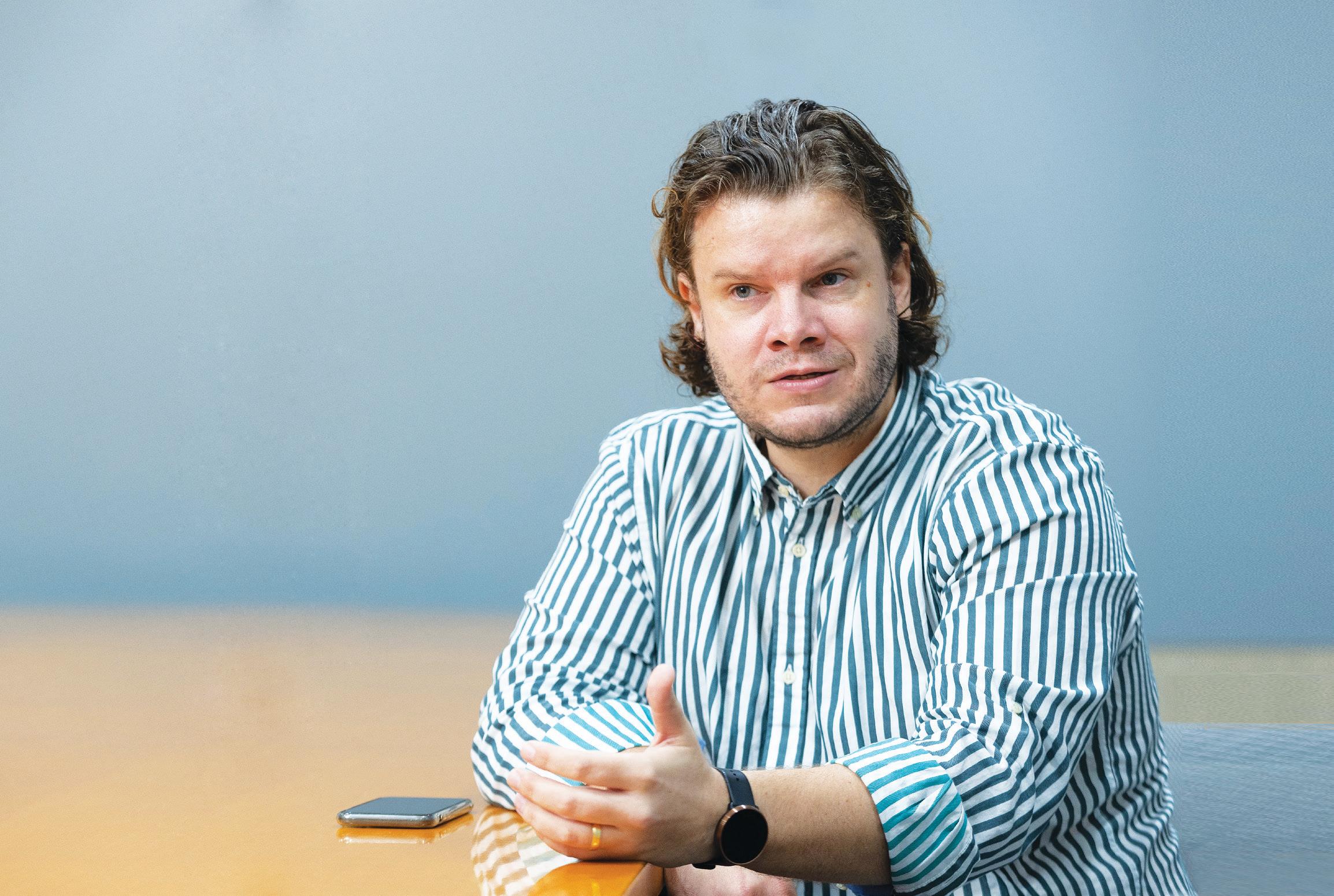
Applying Neuroscience in Public Administration
As a member of the Laboratory for Public Management and Policy, George is part of a handful of researchers who study policy and organisational design, management practices and interactions between citizens, interest groups and public organisations. The lab focuses on experimental designs,
systematic research synthesis and analysis of observational data to make best practice recommendations and suggestions.
Riding on this, George wants to inspire his students while getting on his own helicopter to think about how to create purpose and reinvent himself.
“I’m keen on developing new approaches through my research by using neuroscience, it’s been at the top of my mind, no pun intended,” he says with a smile.
With CityU’s capabilities and its focus on the brain as one of its key strategic pillars, George hopes to further understand neurological responses to public administration phenomenon both in citizen-state interactions but also in managerial decision-making.
“That’s really been a black box in our field and I want to see how public administration and neuroscience can be blended and advanced in our field, that’s something I hope to develop by coming here, a neuro public administration,” he says.
ISSUE 14 | CITY CLASS 15 PEOPLE
George is keen on developing new approaches through his public administration research that uses neuroscience.
Unveiling the Mystery of the Human Brain for AI Advancements
While machines can learn how to predict words, we have yet to understand how the human brain does it, and Dr LI Jixing’s research aims to uncover the secret
Dr LI Jixing always imagined herself as a writer and that she would be doing something creative in languages one day.
But little did she know that her creative journey would eventually lead her to the forefront of the world’s most cuttingedge research into computational neurolinguistics.
“When I began to realise that language is not an external object, but rather an internal object and a part of human cognition, I found that I was really interested in psychology, and this is where I developed a strong interest in psycholinguistics,” recounts the Assistant Professor at CityU’s Department of Linguistics and Translation and Assistant Professor (Affiliate) at the Department of Social and Behavioural Sciences.
Li kickstarted her educational career studying for her BA in
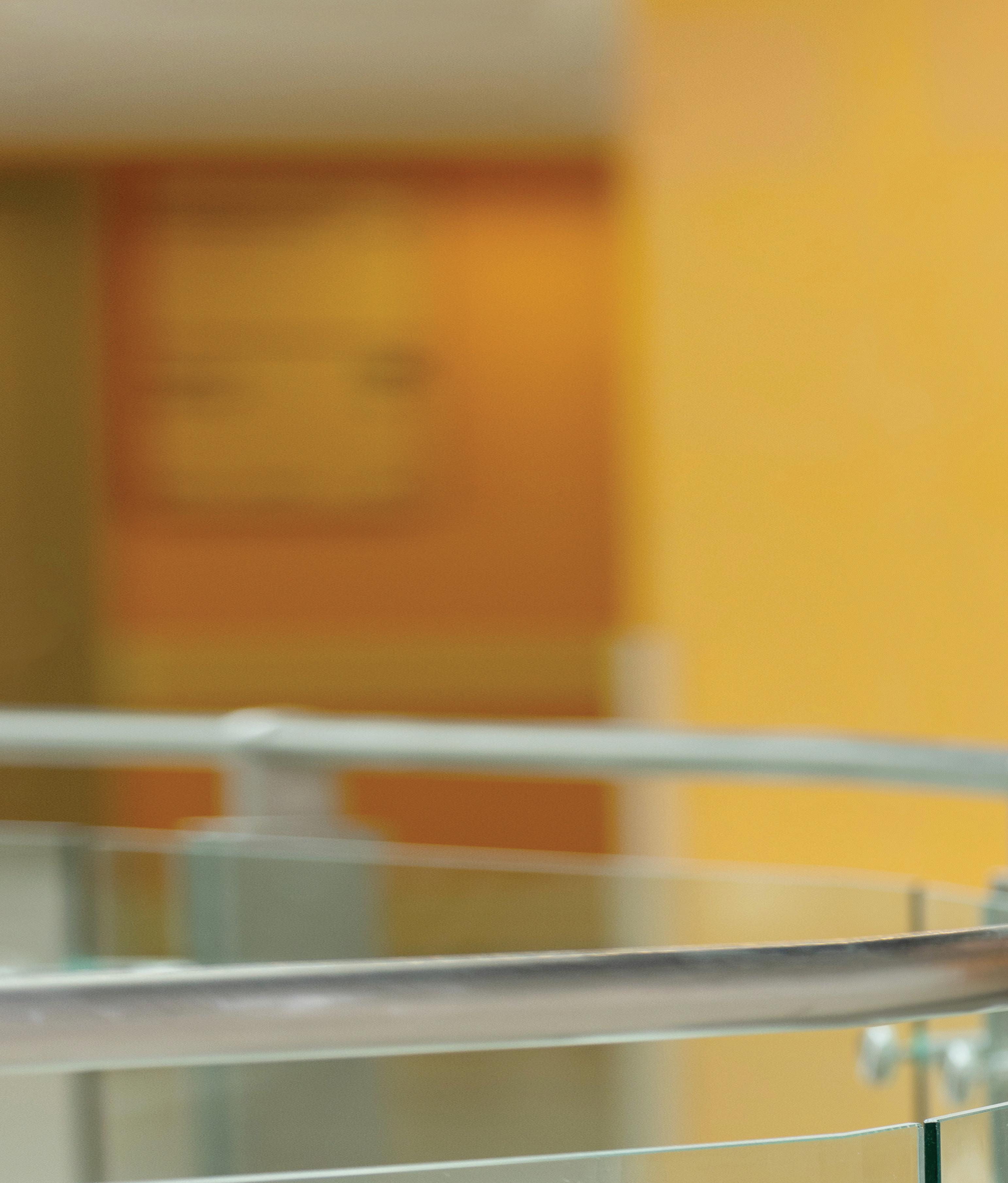
English and Chinese at the Beijing Normal University. Then, with a newfound interest in language theories, she went to the UK to pursue her MA in Linguistics, from which she developed her strong interest in psycholinguistics. This eventually led her to complete a second master’s degree in Experimental Psychology at Oxford University and her PhD in Linguistics at Cornell.
At the time, her intention was to just focus on psycholinguistics, but her advisor, Professor John HALE, was a computational linguist by training and was also doing fMRI experiments. Inspired, she ended up in computational neurolinguistics and her research today applies computational models to understand how the human brain represents and computes information during language comprehension.
16 CITY CLASS | ISSUE 14 PEOPLE
Li's research applies computational models to understand how the human brain represents and computes information during language comprehension.
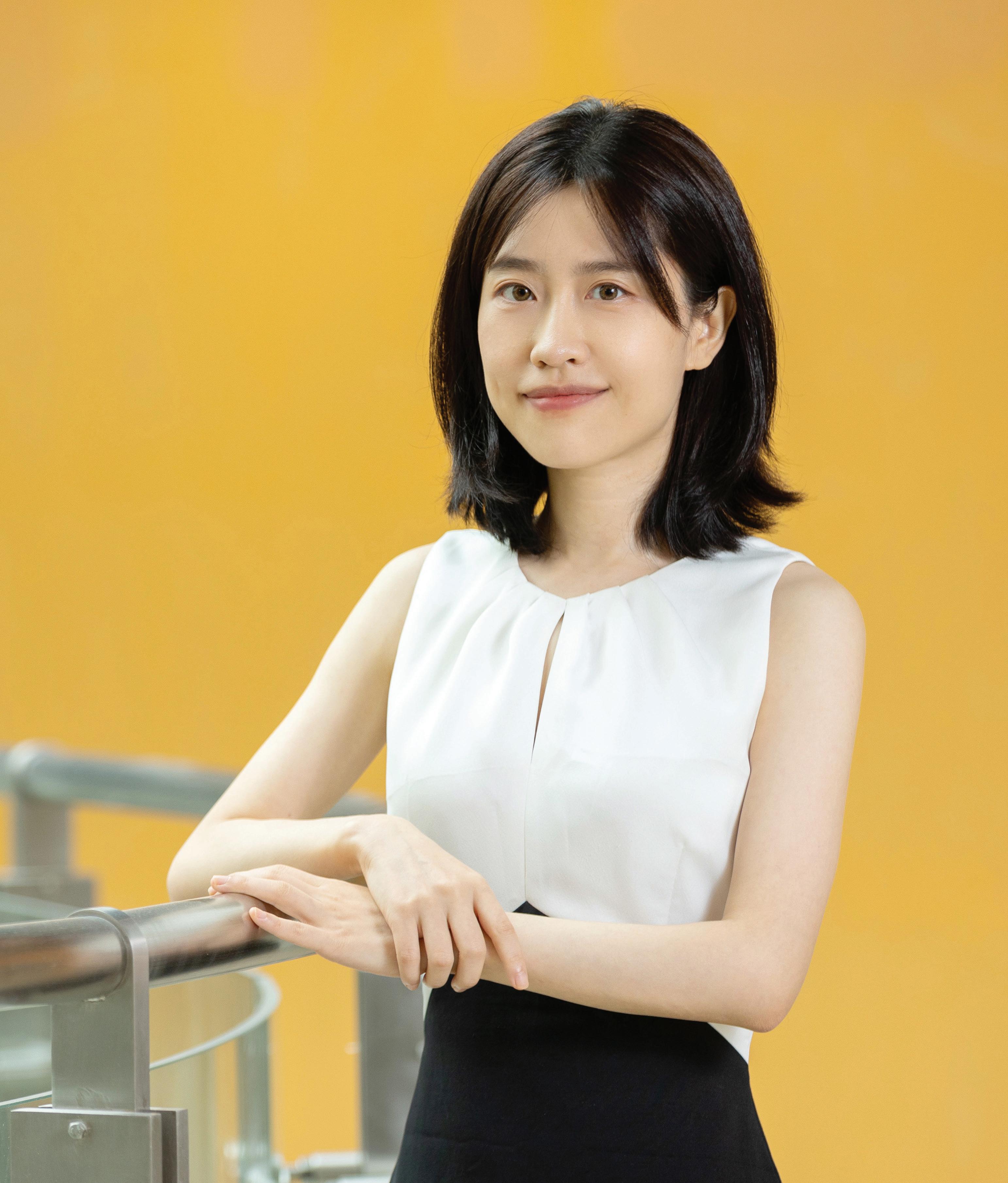
ISSUE 14 | CITY CLASS 17 PEOPLE
Li aspires to find an exciting community of like-minded fellows in academia for a deeper understanding of the human-machine interface.
“I am so happy that Professor Hale got me into this field, especially at this time with all the developments in AI. People are interested in how we understand human cognition, and language is at the centre of that,” she says.
Indeed, Li has huge goals. Aside from getting tenured in the next five years, she is driven to bring her research team to the forefront of neurolinguistics studies in the world.
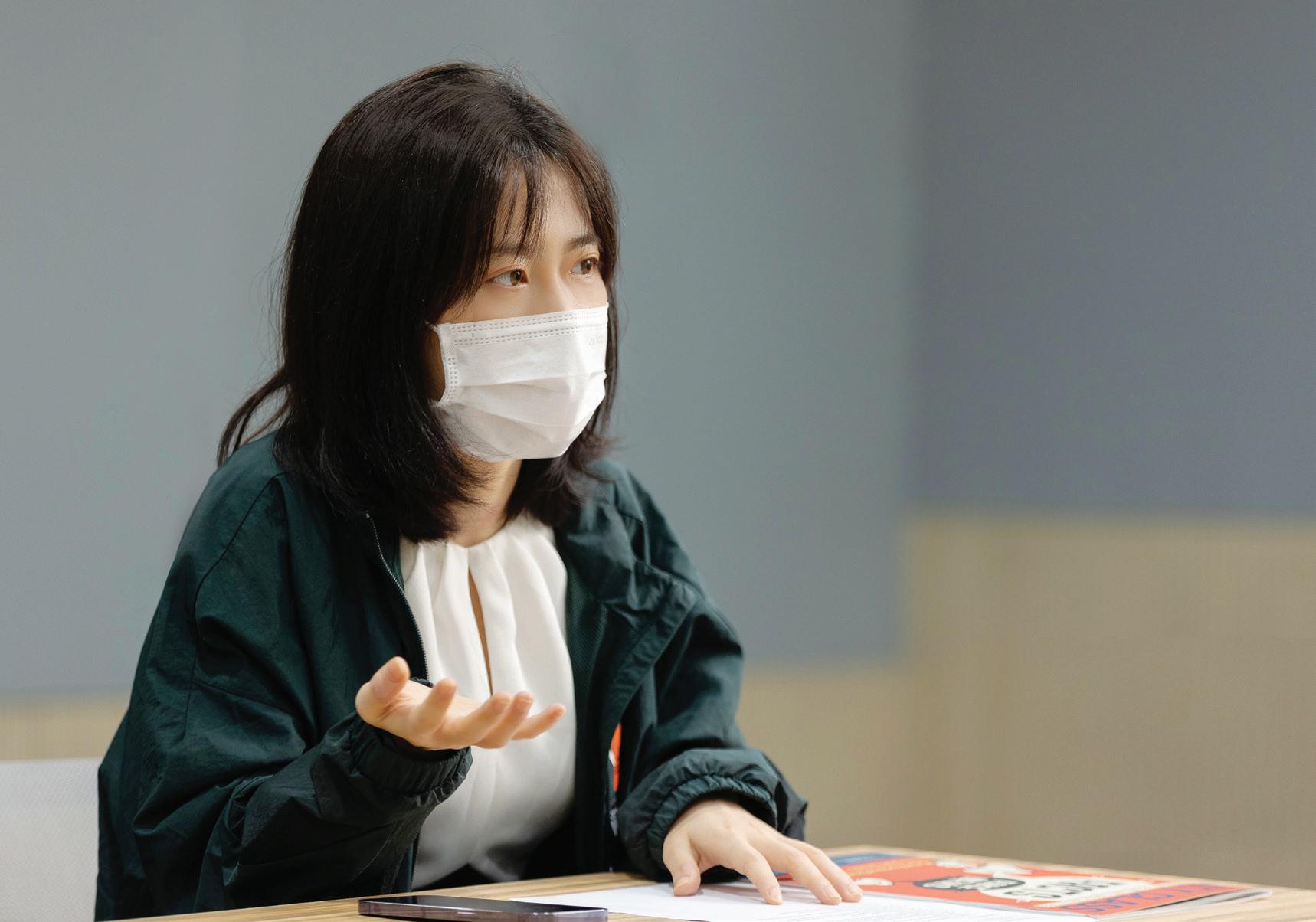
“I want to promote the interdisciplinary study of cognitive neuroscience, language and computer science, to develop a scientific approach to linguistics,” she says.
The Neural Mechanisms of Language Comprehension
As she begins to explain the nature of her work, it is easy to see why her research is critical in today’s tech-driven world. Humans are constantly predicting the next word when we hear speech. Citing an example, if we heard the sentence, “I spread the butter with socks”, the human brain would know that the word “socks” does not fit into the context. Li explains that the brain sends a strong signal around 400 milliseconds after we hear the word “socks”, and these neural signals can be measured using neuroimaging techniques such as EEGs, MEGs, ECoG, and fMRI.
18 CITY CLASS | ISSUE 14 PEOPLE
I want to promote the interdisciplinary study of cognitive neuroscience, language and computer science, to develop a scientific approach to linguistics
Dr Li Jixing
She then explains that machines can also predict the likely next words. For example, when we input a keyword in search engines, Google finishes the sentence for us. In this respect, one of Li’s key research areas focuses on comparing these predictions for the next words using computational models and then comparing them with the neural signals to see if the models can inform us about the neural mechanisms of language comprehension.
“This is an exciting area in my research because we don’t know how humans predict words. We know how machines do it, so we can use a machine model to compare it to humans to learn how the human brain works. Neurons don’t do what machines do, but there might be some shared computational principles at a higher level,” she explains.
A Field with Growing Importance
Li has spent six years on this research, which is still in its infancy. “We still don’t know how to map linguistic theories to human neurobiology,” she explains. So, the key to solving this mapping problem is first to build the computational models that can quantify theories into testable predictions and then compare model predictions against human brain data.
But her research is not her only career goal. She also hopes to create a centre at CityU devoted to the interdisciplinary study of linguistics, natural language processing, and cognitive neuroscience.
For these reasons, CityU was her most obvious choice when she moved to Hong Kong.
“You have to find your community and surround yourself with likeminded people. They will get you excited about your research,” she says.
CityU is a reputed leader in interdisciplinary research. As “Brain” is one of the University’s five overarching research themes, Li feels right at home.
Indeed, CityU defines this field that Li is in as an interdisciplinary field that covers biology, neuroscience, medicine, psychology, computer science, and linguistics to study the human and computer brain for a deeper understanding of the potential of the human-machine interface.
In the world of modern technology and AI, Li believes this field is only going to become more important.
“Understanding languages is part of AI, and it’s important that machines understand us. Right now, people in AI approach this problem as an engineering process, so they train machines with texts from books and ask the machines to use these books to predict what people will say next,” she explains.
However, as humans, she said that we do not need books to be able to predict each other’s speech, so how do we do it?
“The brain is like a black box, and we don’t know how it works, so we are using models to inspire us to understand how human brains work and give feedback to neuro-engineering to build brain-inspired models,” she adds.
Indeed, it is easy to see what gets Li out of bed every day, but she emphasises again that her research is not everything. She is keen to help her PhD students along their way and wants to inspire them to know where to start and how to learn in this exciting new field.

ISSUE 14 | CITY CLASS 19 PEOPLE
Li's research studies the ways in which humans predict words through comparisons with machine models.
Sex is Power: Women’s Self-Objectification in Competition
Although women are stereotypically considered to shy away from competition, they are competing for valuable social resources in modern society. According to the Organisation for Economic Co-operation and Development (2020) and the International Labour Organisation (2020), 47.66% of women aged above 15 worldwide are competing in the job market. Facing competition for social resources, people should resort to competence, a highly valued trait in this context.
Unfortunately, women continuously experience marginalisation, while the benefits brought by physical attractiveness seem obvious especially for them. Competition may lead women to value their physical features over their inner qualities (including personalities, thoughts and feelings), a phenomenon known as self-objectification. Those who engage in self-objectification, perceive and treat themselves merely as objects to be evaluated based on looks.
In addition, this effect could be more robust among women who believe they can achieve a sense of control over others, especially men, through their sexuality—the belief that sex is power. In other words, physical attractiveness is used as a tool or a “shortcut” for these women to gain an advantage over their competitors.

To test whether competition, in either work settings or a broad form of resource fighting, would interact with the “sex is power” belief to result in self-objectification among women,
Dr WANG Xijing, Assistant Professor of CityU’s Department of Social and Behavioural Sciences, worked with other researchers to confirm these predictions across five studies: competition or a sense of competition as a feature of the working environment (Study 1); a real state in one’s life (e.g. job hunting, Study 2) or a temporarily activated state via experiments (Studies 3-5); results in self-objectification among women who believe sex is power (Study 1); or enter such a mindset temporarily (Studies 2-5). In addition, such competition could be for job opportunities (e.g. fighting for an offer) or career advancement (e.g. competing for a promotion) or in a broad form of obtaining resources (e.g. climbing the social ladder). It is worth pointing out that this effect is prevalent and can be observed in both the USA (Study 4 and 5) and China (Studies 1-3)—countries that vary in multiple dimensions, such as ethnicity, culture and ideology.
The findings have practical implications. First, self-objectification leads to various detrimental consequences, including anxiety, depression, as well as impaired physical and cognitive performance. Women should be encouraged to use competence-based, rather than appearance-based strategies when facing competition. Second, this research sheds light on the intervention for self-objectification in the workplace. Given that competition interacts with the “sex is power” belief to result in self-objectification, this mindset should be discouraged, at least in the workplace. For example, situational factors such as how others, especially other-gender colleagues and power holders, interact with women, and unspoken rules in the workplace should be adjusted to help women avoid this belief. More broadly, to prevent women from holding the “sex is power” belief and selfobjectification, they should be encouraged to act collectively to strive for a more equal social environment in terms of education, income and career opportunities.
Publication and achievements
Wang, X, Chen, H & Chen, Z (2022), Women’s SelfObjectification Under Competition When They Believe Sex Is Power, Archives of Sexual Behavior, vol 51, no 6, pp 2837–2854. DOI: 10.1007/s10508-022-02335-2
20 CITY CLASS | ISSUE 14 RESEARCH
Feeding on Fancies During China’s Great Famine
Can recipe books be used as historical material for research?
Can they reflect political and social situations? If you believe that recipe books can only teach you how to cook, you may be underestimating some important sources that reflect our history.
Numerous scholars have argued that recipe books can be regarded as a reflection of the history, culture, society and identity of a country or place. Research on recipe books for communal canteens is especially rare in the field of China’s history. Dr FAN Ka-wai, Associate Professor of CityU’s Department of Chinese and History, has conducted research to discuss three recipe books created for communal canteens published in 1959. He used recipe books as the historical material, supplemented with government documents, booklets published by local authorities, newspapers and memoirs, among others, to reveal the diet of the Chinese people during the Great Famine, thus broadening our understanding of the Chinese Communist Party leaders’ thoughts and how they exercised control in the countryside.
In early 1958, China initiated the “Great Leap Forward” campaign. Although previous studies broadened our understanding of this campaign, there is still plenty of room for us to discover more valuable historical sources to provide a more comprehensive picture of this campaign and the ensuing famine. In 1958, the people’s communes were established as an administrative entity in rural China. One of the most important elements of the commune were the communal canteens, which were established to ensure that all the members within the commune obtained a fair share of economic growth while forbidding the preparation of food at home.
By the end of October 1958, over 2.65 million communal canteens were established across the country, and 70-90% of villagers ate in communal dining halls. Since free meals were provided every day, it was difficult for the canteens to design and cook many different dishes. The original intent behind publishing recipe books was to help the cooking staff in communal canteens to offer easy-to-make, nutritious and delicious dishes. The three recipe books studied in the research suggested that communal canteens provided a wide variety of delicious and nutritious dishes, such as those containing meats and eggs. In reality, however, the recipe books were not pivotal in the development of communal canteens because of the nationwide great famine that began in late 1958.
Using now available historical material and based on a variety of analytical methods, scholars can estimate the number of deaths due to starvation during the Great Famine. The main causes of death have been determined to be edema and malnutrition. The recipe books were used by China as a means to introduce a communist utopia into everyday life. In 1959, many provinces and counties still promoted communal canteens and published booklets sharing their experiences creating new cooking methods with reference to food augmentation methods. The false idea that there would be enough food to feed everyone simply by renaming dishes and mixing coarse grains with rice, was one of the causes that made the famine spiral out of control.
Publication and achievements
Fan, KW (2022), Feeding on Fancies with Recipe Books during the Period of China’s Great Famine (1958–1961), Food, Culture & Society. DOI: 10.1080/15528014.2022.2054503

ISSUE 14 | CITY CLASS 21 RESEARCH
How Information on SNSs Influences Our Impression Formation
seeker’s personal and interpersonal certainties about the target, Dr Nancy DAI Yue, Assistant Professor of CityU’s Department of Media and Communication, led a research project to investigate how the information seeker’s interpersonal and personal certainties about a target person were influenced by (1) positive and negative information on SNSs about a target person, (2) the source of the information, and (3) an information seeker’s positivism bias in interpersonal interactions. It is the first empirical attempt to separate interpersonal and personal certainties in person perception.
The research team designed an experiment to verify if interpersonal and personal knowledge were indeed separate concepts in the impression formation process and how different types of information on one’s SNS influenced both. The experiment was carried out by showing participants different versions of a fictitious target’s social media profile that varied in 1) whether it gave positive or negative descriptions about the target person and 2) whether the information was written by the target person or a third party.
We get to know people by gaining knowledge about them, such as talking to them, talking to others about them, or observing how they react in certain situations. This is known as the uncertainty reduction process in interpersonal communication. In the contemporary media environment, what people publish about themselves on social network sites (SNSs) provides information seekers with plenty of knowledge about the person. Previous research, however, showed that the SNSs information did not help an information seeker reduce uncertainties or feel closer to a person as much as directly interacting with the person.
To explain this, previous research proposed a distinction between interpersonal and personal knowledge. Personal knowledge refers to how a target person feels, thinks, and behaves in certain situations. Interpersonal knowledge, on the other hand, refers to how a target reacts to an information seeker in a unique fashion different from how the target responds to others. It is argued that interpersonal knowledge can only be gained from direct interactions and it is the kind of knowledge that ultimately makes up the essence of affinity and intimacy.
To answer further inquiries about how the information one can find about a target online contributes to an information
Dai and her research partner discovered the following findings. First, reading SNS information about a person increased personal certainty more than interpersonal certainty, regardless of whether the information posted by the target person or a third party. Second, reading negative information about the target increased the information seeker’s interpersonal knowledge about the target more than positive information, but this did not occur for people who had a higher confidence in being liked by others in social interactions. In other words, people with a lower general confidence in being liked by others were more influenced by negative information on a target’s SNS information when it came to predicting whether they would be treated nicely by the target in direct interactions.
Publication and achievements
Dai, Y, & Shin, S Y (2022), How Reading Information on SNSs Influences Interpersonal and Personal Certainties about a Target: The effects of Information Valence, Information Source, and Positivism Bias, Communication Studies DOI: 10.1080/10510974.2022.2118341

22 CITY CLASS | ISSUE 14 RESEARCH
Multimodal Construction of Interculturality in YouTube Videos
Social media platforms such as YouTube are becoming increasingly popular for information sharing, and for identity performance. Online video-mediated communication has been further popularised by the COVID-19 pandemic which sees more recreational and educational content posted online to reach a global audience. Online video-sharing platforms provide a space for influencers or educators to interact with audiences from different linguistic and cultural backgrounds, thus creating opportunities for intercultural communication through online videos. In particular, how
cultural identities are conveyed through the multimodal affordances of online videos warrants further investigation.
Multimodal resources play an important role in the creation of video-based materials. The multimodality of videos offers content creators an enlarged set of resources, in addition to the use of language, to make meaning, and to perform their cultural identities. The notion of interculturality emphasises the interconnectedness of different cultures and considers how participants use different resources available to them to perform their cultural identities.
Dr Jenifer HO, Assistant Professor of CityU’s Department of English, investigated how a multilingual YouTube influencer and his co-presenter who have a transnational trajectory orchestrate their multilingual and multimodal repertoires to make aspects of their identities relevant or irrelevant in a strategic way, to perform their multiple cultural identities.
The study found that interculturality is made visible in online videos through influencers’ performance of dynamic and flexible multilingual practices. Furthermore, medium affordances such as images, camera angle, video-editing effects and so on are also deployed to construct the influencers’ transnational cultural identities.

The study has implications for influencers, educators and the general public who want to create video-based materials for a global audience. The study highlights how influencers strategically deploy their multilingual and multimodal repertoires when creating videos. While it is important for content creators to convey information linguistically, the multimodal dimension of meaning-making and intercultural communication is equally significant.
Publication and achievements
Ho, W Y J (2022), “Coming Here You Should Speak Chinese”: The Multimodal Construction of Interculturality in YouTube Videos, Language and Intercultural Communication DOI: 10.1080/14708477.2022.2056610
ISSUE 14 | CITY CLASS 23 RESEARCH
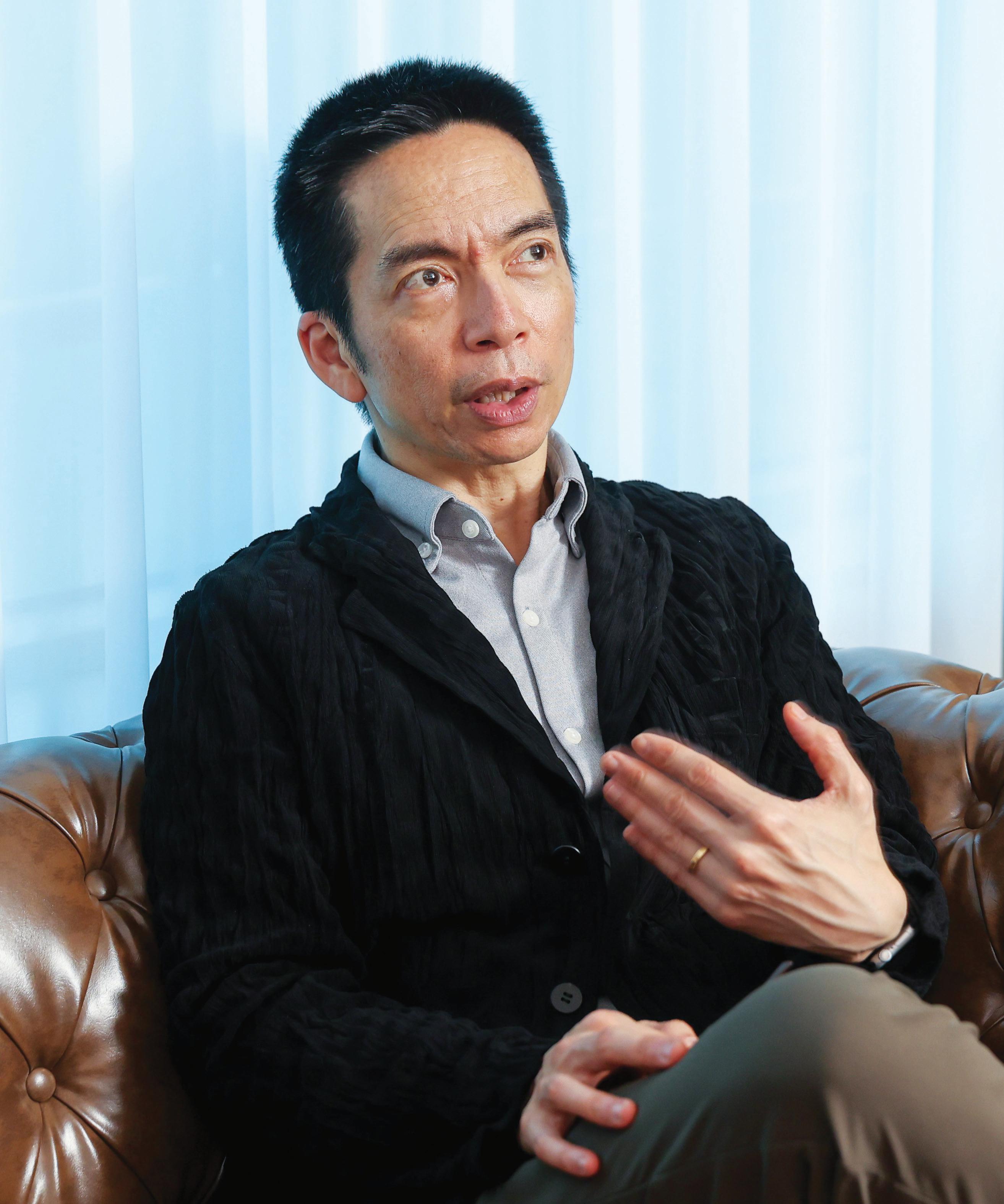
24 CITY CLASS | ISSUE 14 SOCIAL IMPACT
Maeda is celebrated for advocating for the STEAM initiative, injecting art and design into STEM education.
Simplicity Speaks Sagacity
Having earned an honorary doctorate at City University of Hong Kong, Dr John MAEDA delineates his path as a versatile leader in multiple disciplines and his pursuit of simplicity
Bristling with aplomb and buoyancy, Dr John MAEDA stands out at the intersection of design, computing, art and education for his pioneering innovations. He is a globally celebrated technologist, designer, author and entrepreneur whose contributions extend beyond the disciplines.
Maeda, currently Vice-President of Design and AI at Microsoft, was an early catalyst for generative art and computational design for commercial applications across Web2 and Web3. During his early career, he taught Media Arts and Sciences at the Massachusetts Institute of Technology (MIT) and served as Associate Director of Research in the MIT Media Lab. He also served for the Rhode Island School of Design (RISD) as its 16th President from 2008 to 2014.
In November 2022, City University of Hong Kong (CityU) conferred an Honorary Doctor of Engineering on Maeda, who later engaged in a riveting dialogue with Professor Richard M WALKER, Dean of the College of Liberal Arts and Social Sciences (CLASS) and Professor Christine HUANG Yi-hui, Associate Dean (Faculty and Research) of CLASS. He spoke of the bumpy but profound journey as a versatile leader and shared his wisdom on resilience and multidisciplinary education, imparting advice to young students in the digital era.
The dialogue was surprisingly in unison with what CLASS resolves to accomplish. Aside from fostering academic and professional exchanges in humanities and social sciences, the College has been assiduous in exploring the humanistic perspectives on science and technology advancement through impactful interdisciplinary research in light of the unprecedented challenges in the global society so as to nurture innovators and influencers who will make a positive difference in the world to create a sustainable future.
A Powerful Combo
Unpacking the acronym “CLASS”, Maeda is quick off the mark with Liberal Arts. “It is a strange combination of two words,” says the technologist. “We spend all the time either making something or talking about something. Liberal Arts is a combination of the making and the talking, squeezing two areas together. It gets even healthier and better. All good start-ups are led by CEOs who are both good talkers and makers.”
The prologue of Maeda’s adventure also starts with a wondrous mix of two things as his parents taught him to speak both the languages of “human” and “machine”. “We are in an age when computational power is experiencing the next renaissance,” is his
ISSUE 14 | CITY CLASS 25 SOCIAL IMPACT
view of the digital age, as people have been making what one thought impossible possible. For instance, while new systems of artificial intelligence spring about, robots begin penning articles in the press. He pinpoints that “to speak both machine and human gives people an advantage and resilience”.
Among Maeda’s accomplishments, one cannot miss that he launched the STEAM initiative. He added the letter A for the arts subject to the STEM acronym, which represents the learning of science, technology, engineering and mathematics. To him, art and design are twin transformational forces in the 21st century, carrying the same weight as science and technology did in the last century. He recalls, “I talked to art teachers in the States and found that art classes were shrinking and losing ground. I had to advocate for the arts. I studied the development of science education and identified the solution that once tackled the preceding problem: to reveal the importance of it.”
Beyond Boundaries
Having acquired technology, design and business expertise, Maeda drives cross-disciplinary endeavours in full swing. Asked about disciplines and boundaries, he recollects his artistic pursuit in his late 20s. “I was still doing all kinds of stuff, but people told me to focus on one craft and stop doing many things. Until I met Takenobu IGARASHI, a Japanese sculptor and product designer, in his studio in Tokyo. He mentioned two ways of creating new lives: to be good at one thing or to be very broad.”
“Imagine you are building a mountain. When the mountain goes very high, but if one thing goes wrong, it falls over. When another mountain is low and very broad, it is stable. Mount Fuji represents the symbol of beauty in Japan because it is immovable.” Heeding the sculptor’s wise words, he has set his mind to cross-disciplinary and breadth-based education, which helps him be more resilient in times of change.
In Maeda’s view, academia is designed like the periodic table of elements. He elaborates that, “The power of academia is the ability to reduce elements to the purest form. But the problem is that when students want to dabble in different elements, they run into the fault line. I can tell CityU is finding ways for people to absorb different things more easily.”
“I like when people care about their disciplines,” he remarks.
Dr John Maeda
“If I can have multiple perspectives come together, the sum will be greater than its parts. While the faculty members are erudite about their disciplines, they may stay curious about other aspects. That is exactly what collegiality is.” His view resembles CLASS’s mission which bears an unwavering dedication to incubating impactful interdisciplinary research for a sustainable future.
Favourite Failure
Think about the decisions you have made today. Chances are you have made many decisions, some of which turn out to be mistakes prone to failure. Maeda frankly recounts his “favourite failure” when he was the President at RISD. He says, “I made many changes happen and moved things forward, like introducing systems and new ways to the school. It made me unpopular among the faculty. The entire faculty voted no-confidence in me. It went public and all over the media.” The harder he tried unravelling the problem, the more failure he had.
26 CITY CLASS | ISSUE 14 SOCIAL IMPACT
To speak both machine and human gives people an advantage and resilience
Notwithstanding the rebuke, he was determined to soldier on. It was not until he sought advice from a consultant that he got to the bottom of what went wrong. He reminisces, “The consultant told me that I was a product of the American Dream. I once reckoned that if you do the right thing, the right thing will happen for you. But it is a fictional concept. I was repeatedly failing because I thought the right thing would happen.”
Maeda gained a new insight into the talker’s world from the consultant, revamping his own worldview. He explains the epiphany: “There is the undecided majority who will go to the winning side when the dust settles. My mind woke up. It is not about right or wrong, good wins or bad wins. Instead, it is all about the momentum. The entire world has been living in this kind of binary system for so long. In the world of talking and relating, people constantly ask, ‘are you with me or against me?’ It is not about making anything.” He has stopped seeing the world in one way since then.
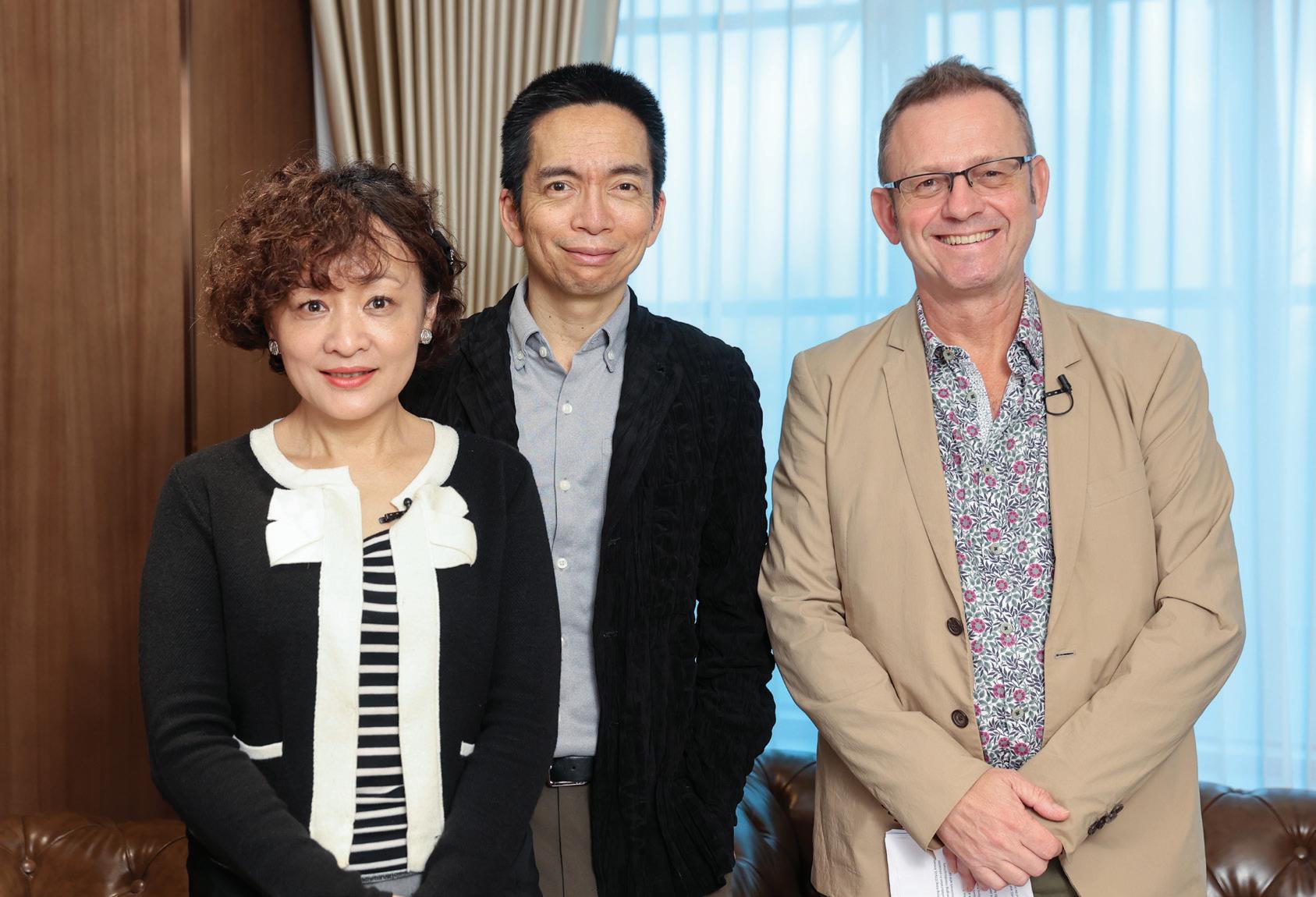
Breadth or Depth
When asked what advice he would give students, Maeda heaves a brief sigh, expressing sympathy for and empathy with the young. “In the old days, you could choose what to become and educate yourself to become that. But nowadays, the job would be gone by the time you graduate. It is more challenging than the past when I was a student.” He advises future torchbearers to stay agile, and such agility comes from breadth instead of depth.
Maeda peels away layers one after the other and comes in touch with the crux of simplicity. As he concludes, “Learning makes things simpler. I believe in education, so I invest time in learning. That is how I make it look so easy. Also, saving time feels like simplicity.”
One analogy he likes to use is “compression”. Just as this article attempts to compress his sagacity, a good compression of complex things indeed consumes plenty of time. If one is ready to make an effort, simplicity will not be out of reach after all.
Professor Richard M Walker (right) and Professor Christine Huang Yi-hui (left) met Maeda and had a voluble conversation.
ISSUE 14 | CITY CLASS 27 SOCIAL IMPACT
CLASS Advanced Methods School Ushers Scholars into a New Era of Research
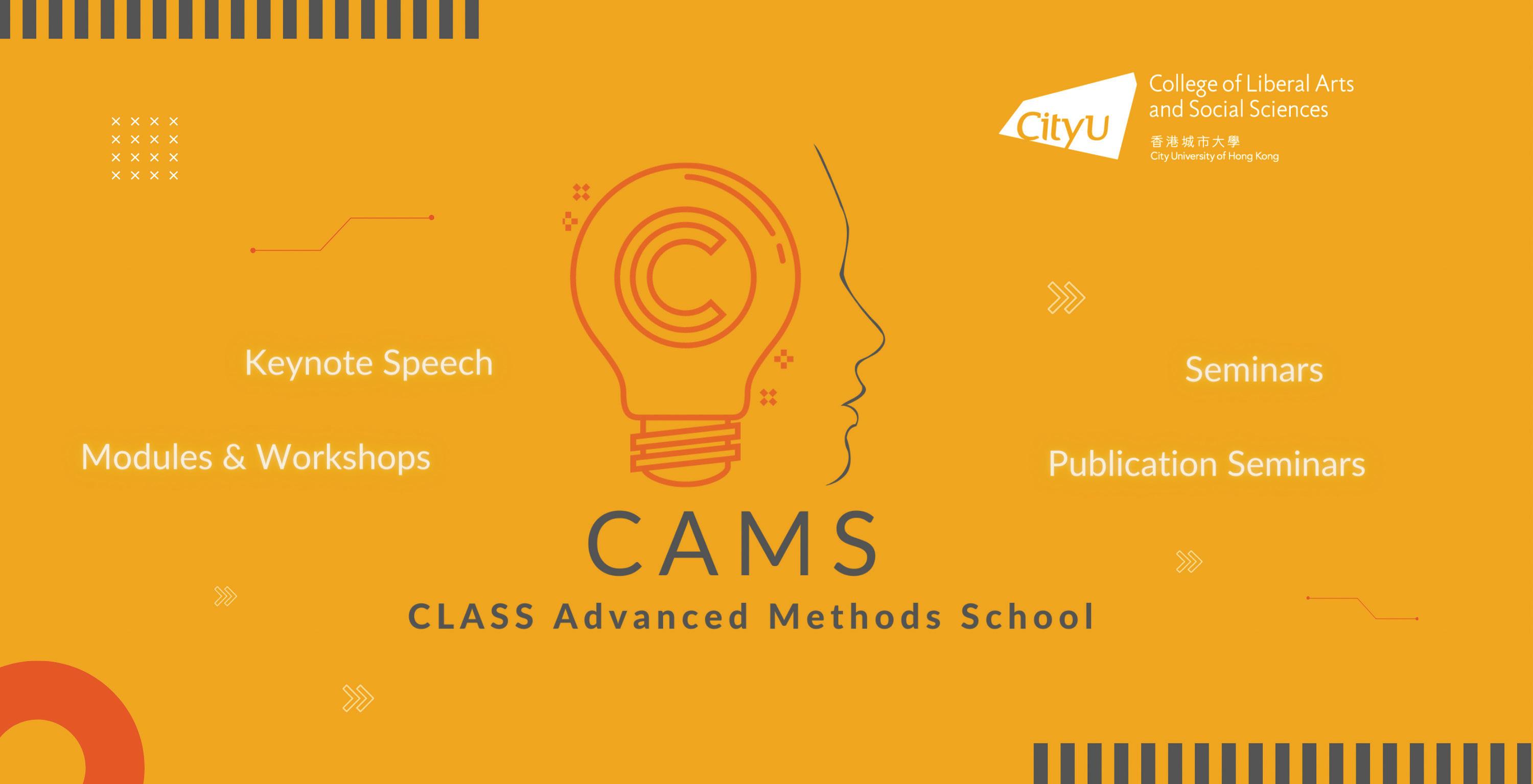
CLASS Advanced Methods School organised online events for international scholars and postgraduate students to soak up data-driven methodology for liberal arts, humanities and social sciences research
n God we trust; all others must bring data.” The words of William Edwards DEMING, a prominent statistician from the last century, reveal the unswerving power of data in the current era. Data narrates the stories of our society, depicting issues and trends for more significant insights.
“I
This feature is equivalent to research methodology, a distinct subfield touching upon computational methods, survey experiments and data science. Meanwhile, human values and behaviours remain to be investigated through other theoretical traditions and methodological approaches, including historical, qualitative and ethnographic methods. Among many scholars and methodologists,
the inquiry, “How does data-driven research prevail in liberal arts, humanities and social sciences?” gains much attention.
Gear Up for Advanced Methods
It is critical to address researchers’ surging demand and foster interdisciplinary collaborations in today’s academia. The College of Liberal Arts and Social Sciences (CLASS) of CityU has established the CLASS Advanced Methods School (CAMS) as an avenue to equip researchers and students of CLASS and beyond with conceptual and technical competency deemed essential for theoretical and empirical inquiries.
28 CITY CLASS | ISSUE 14 EVENTS
in her new book, “In Praise of Skepticism: Trust but Verify”.
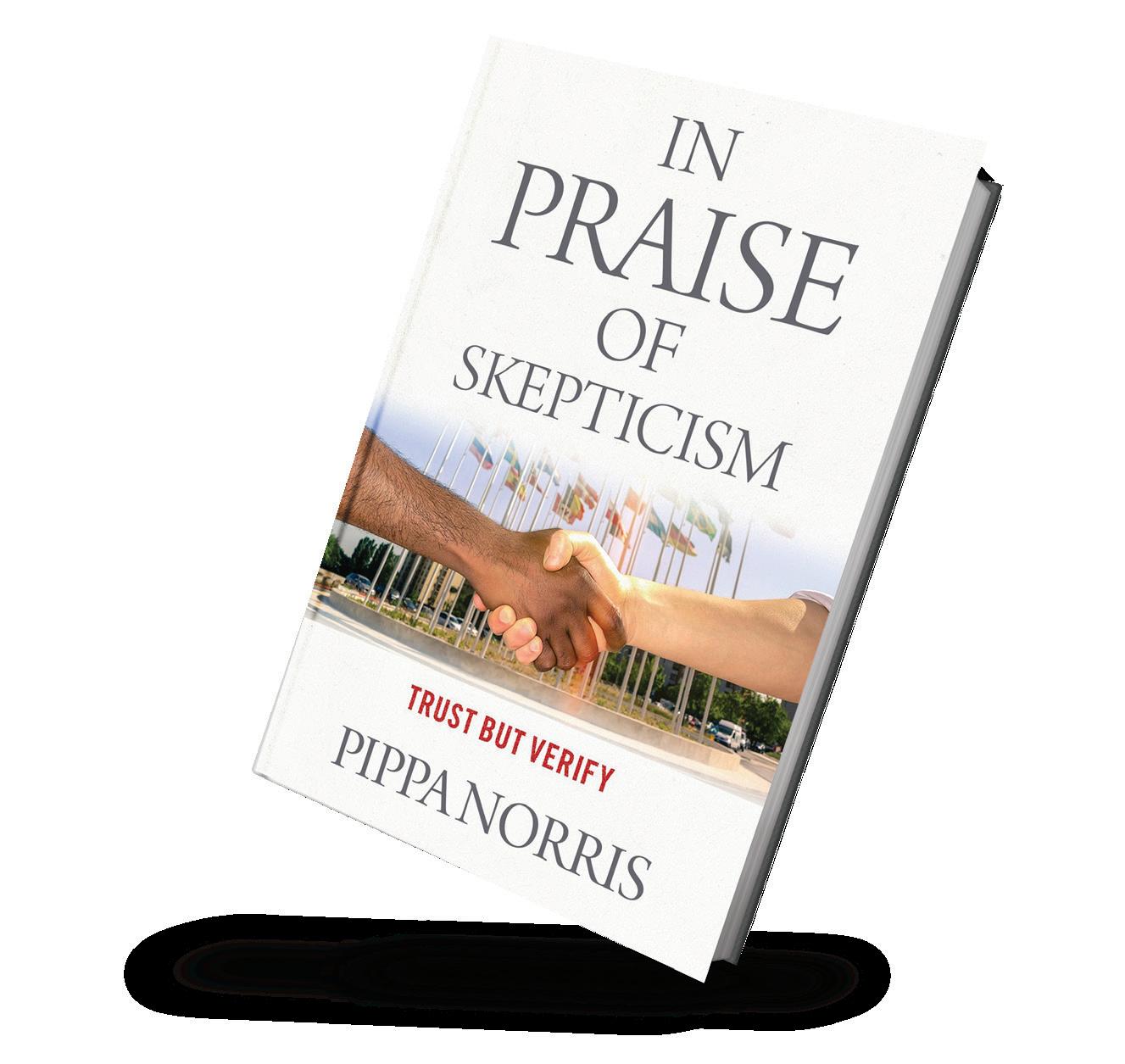
On 6 June 2022, CAMS kickstarted the summer school by organising a keynote speech. Professor Richard M WALKER, Dean of CLASS, outlined CAMS’s background and objectives to expose young researchers and students to various advanced research methods training. Later, Professor Christine HUANG Yi-hui, Associate Dean (Faculty and Research) of CLASS, previewed all 14 CAMS events incorporating three components: research design, method training and practical toolkits with the audience. She then introduced the keynote speaker Professor Pippa NORRIS, a distinguished political scientist at Harvard University who specialises in comparative politics, elections, political culture, gender politics and political communication across the globe.
In What We Trust
In the keynote speech entitled “In Praise of Skepticism: Trust but Verify”, Norris shared her conceptualisation of “trust” and research findings. She started by telling the fable “The Scorpion and the Frog” to illustrate that it is part of human nature to trust others. Trustworthiness, as she sees it, involves an informal social contract where principals authorise others to act on their behalf, expecting
the agent to fulfil their responsibilities, despite conditions of risk and uncertainty.
When evaluating the trustworthiness of political institutions, Norris holds that public judgments should reflect the quality of government procedures, like the principles of competency, impartiality and integrity, and institutional guardrails. The theoretical framework presents the benefits and problems of “trust”, and the erroneous beliefs involve both cynical mistrust and credulous trust.
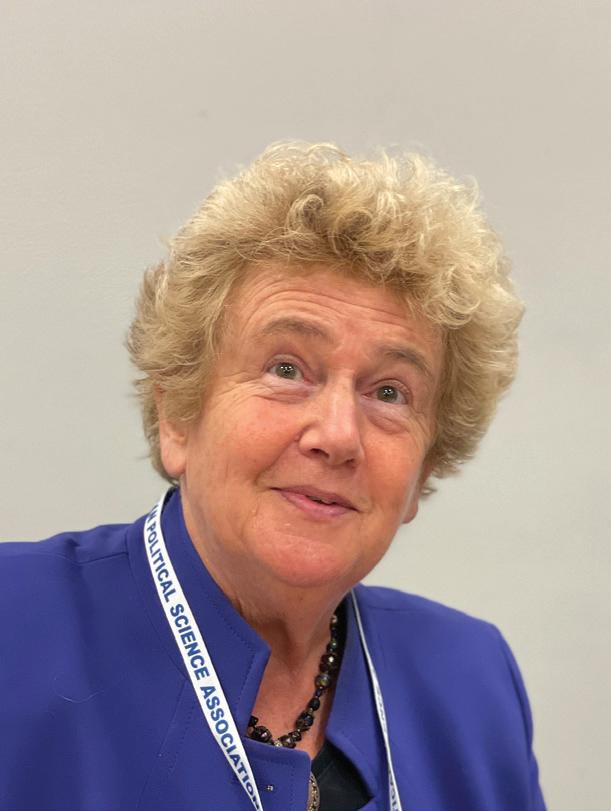
To collect public opinion data, Norris conducted cross-national empirical research by using World Values Survey (WVS)/European Values Survey 7-wave (EVS) between 1981-2021, investigating 115 diverse open and closed societies. WVS-EVS measures interpersonal trust, institutional confidence and trust in global governance.
Norris adopted a three-layered analytical strategy to analyse how subjective perceptions about the quality of governance strengthen confidence in political institutions. Levels of public trust in diverse agents and societies are measured to gauge subjective perceptions and objective indices of agency performance. Such measurement enables a comparison that shows the correlation between public trust and performance. According to the findings, sceptical trust in government is positively linked with a plurality of information and good governance in open societies. In the meantime, cynical mistrust and credulous trust are prevalent in closed societies with poor public administration and limited information access.
The keynote speech was wrapped up with a Q&A session moderated by Dr Edmund CHENG, the Convenor of CAMS and Associate Professor of the Department of Public and International Affairs. Enthusiastic and intrigued, students and scholars from different disciplines and nations had fruitful discussions with the speaker about her theoretical approach, research methodology and how she deals with response bias, geocoding and crosssectional data.
The Line-Up of Scholastic Excellence
In the subsequent weeks, 13 other scholars from around the world delivered modules, seminars and publication seminars, contributing their discoveries of data-driven methods, processes and tools used in liberal arts and social sciences studies.
Having attracted hundreds of local and global participants, CAMS set forth good examples of scholastic excellence and stimulated insightful ideas on advanced methods of research. It brought together esteemed methodologists worldwide to provide up-to-date, wideranging and mixed methods training for faculty members, researchers and students. As they exchanged wisdom and drew on diverse perspectives to solve shared problems, CAMS helped usher in a new era of data-driven research in liberal arts, humanities and social sciences.
Scan the QR code to discover more about the upcoming (and past) activities of CAMS

ISSUE 14 | CITY CLASS 29 EVENTS
Reaping the Harvest from the Grand Tours
Henceforth I ask not good-fortune, I myself am good-fortune Henceforth I whimper no more, postpone no more, need nothing Done with indoor complaints, libraries, querulous criticisms Strong and content, I travel the open road
Crafted by the prestigious poet Walt WHITMAN, this riveting extract from “Song of the Open Road” portrays the unwavering vigour and valour for adventures, albeit two centuries ago. Travel widens explorers’ perspectives, granting them a new lens to perceive things and their position in the world. Such wisdom remains inexorable among university students nowadays as outbound exchanges play a crucial role in international education. Unfortunately, the COVID-19 pandemic shook the world and put travel activities to a halt, let alone student exchanges.
As nations set out to reopen borders and lift the travel
restrictions, many intrepid students of CityU’s College of Liberal Arts and Social Sciences (CLASS) seized the opportunity to embark on their own version of grand tours last summer. During July and August 2022, CLASS offered 39 students places to partake in the Cultural and Language Immersion programme, the Overseas Summer Schools programme or Institute for World Literature.
Having studied in a foreign country for weeks, the batch went out of the way to immerse themselves in a new culture and acquire global exposure. Right before the fall semester, they returned home with an armload of fruitful gains. They gathered at the campus to disseminate their eye-opening stories with other fellows in a debriefing forum on 26 August 2022.
Ask any student who went on an outbound exchange, and they would agree that the once-in-a-lifetime experience taught them a lot. What are the changes brought to them exactly? Harking back on every
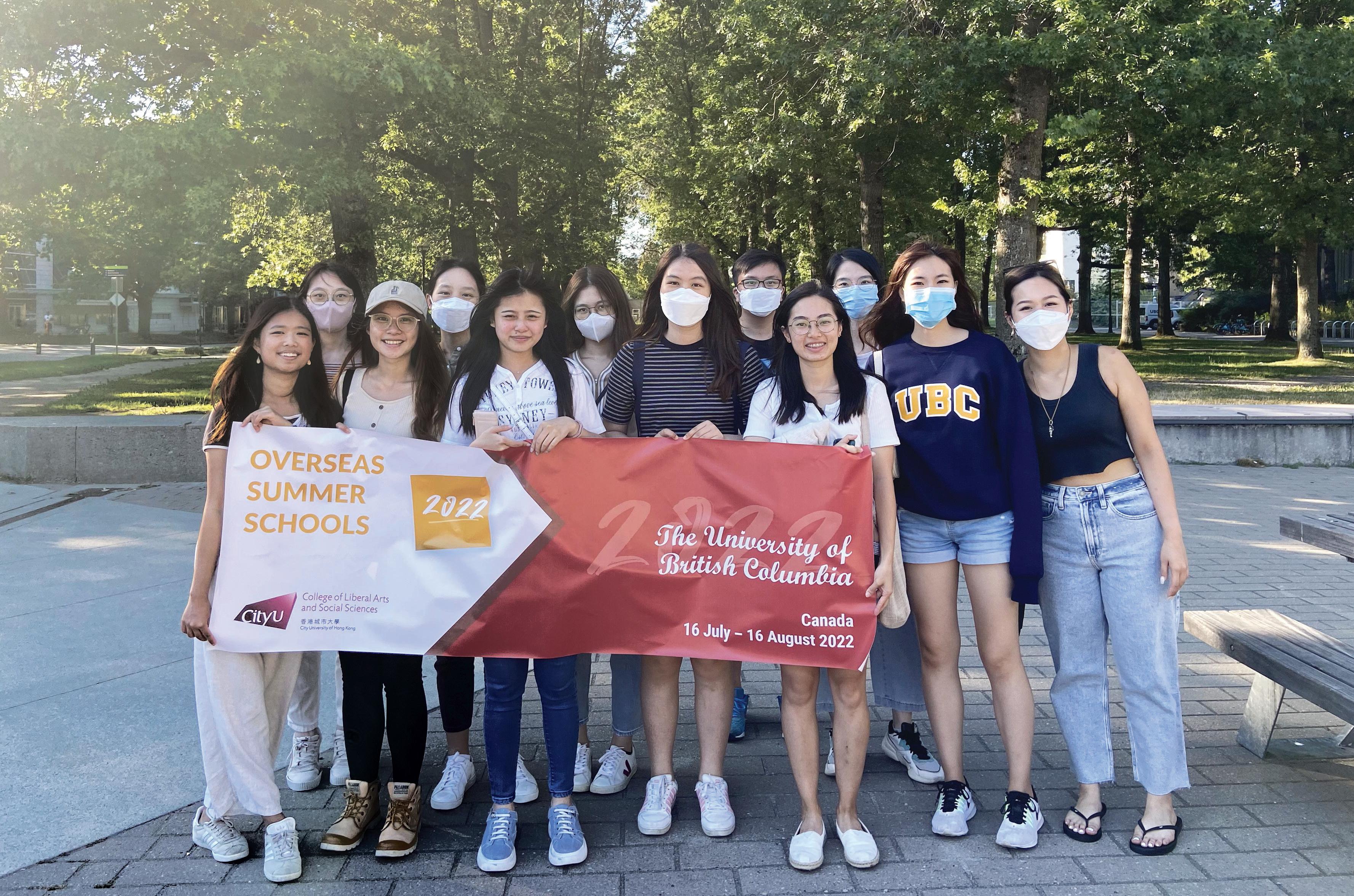
As nations began reopening borders, 39 intrepid students came back to CLASS after the summer exchange, recounting key takeaways and invaluable learnings from their eye-opening journeys
30 CITY CLASS | ISSUE 14 EVENTS
A batch of CLASS students kicked off the Overseas Summer Schools programme at the University of British Columbia in Canada.
moment in a foreign land, representatives of each programme came forward and summarised the key takeaways from the journey.
The Institute for World Literature (IWL)
Three CLASS students participated in the programme of Harvard University’s IWL at Johannes Gutenberg University, Germany. The four-week programme included seminars, colloquia, plenary lectures by distinguished guest speakers, panel meetings and discussions. Nicola WAN Shun-yu, a PhD student of the Department of English, found the trip rewarding as she took the precious opportunity to speak with Herta MÜLLER, the Nobel Laureate in Literature, during the plenary talk. The in-depth discussion was of insightful ideas, prompting her to refine the thesis.
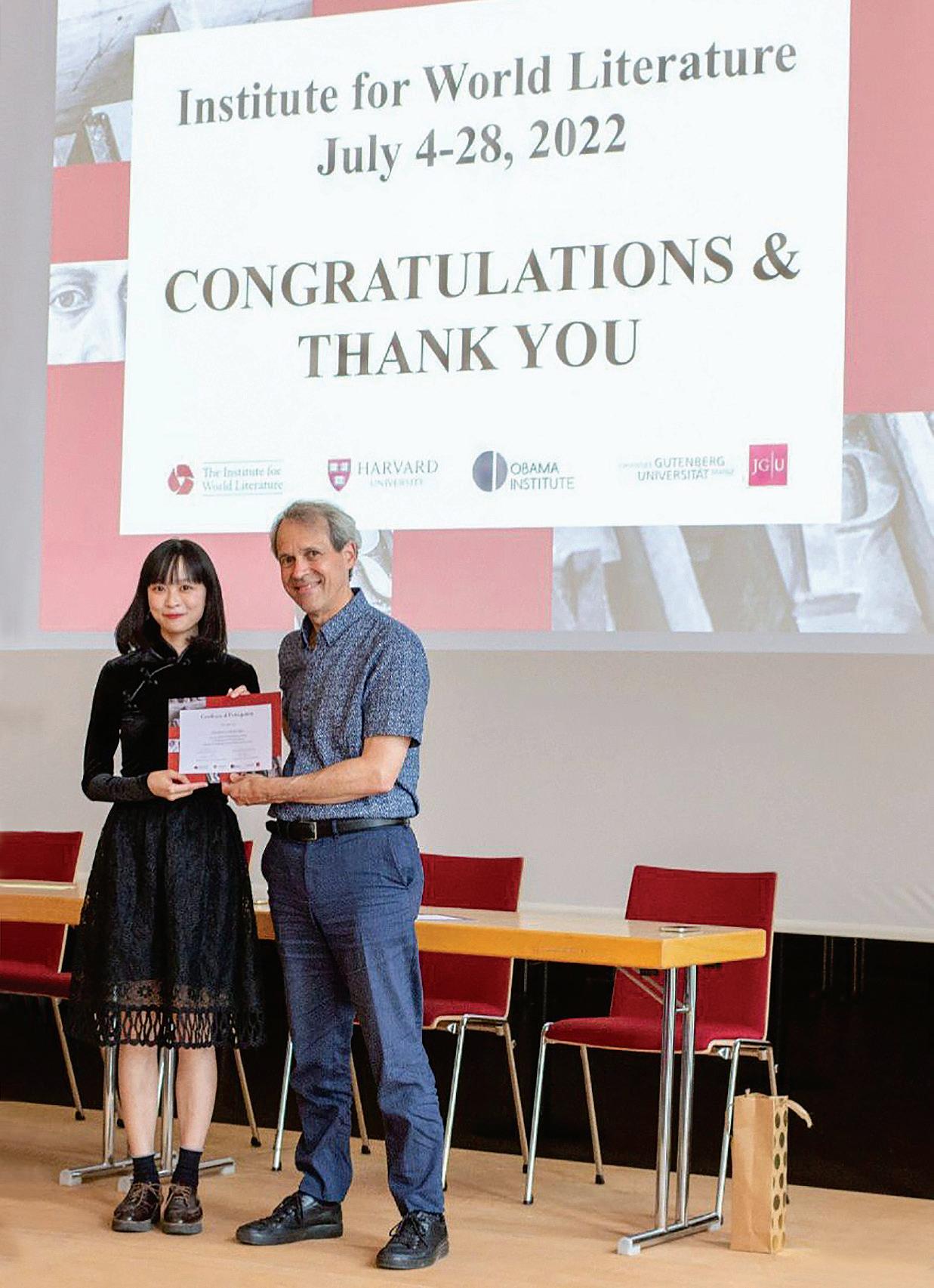
The Cultural and Language Immersion (CALI) Programme
Among seven students joining the CALI programme at Hertford College, University of Oxford, Steve NG Hao-yuan, a Public and International Affairs student, relished cultural activities like punting. He and his teammates picked up some soft skills, such as communication and problem-solving, from the presentation workshops and the MV filming project. He also aspires to work in Bloomberg in the future after visiting the Bloomberg headquarters in the UK.
Overseas Summer Schools Programme
Other students recounted their inspirational stories in different Overseas Summer Schools at University of Cambridge (UK), University of Sussex (UK), University of British Columbia (Canada), and University of Vienna (Austria). Oreo LI Shun-chi, a Linguistics and Translation (LT) student, described his excitement over fulfilling his dream of studying at University of Cambridge, the world-renowned institution. He embraced the challenge outside his field of study and dabbled in Astronomy, Natural Sciences and Landscape Architecture courses.
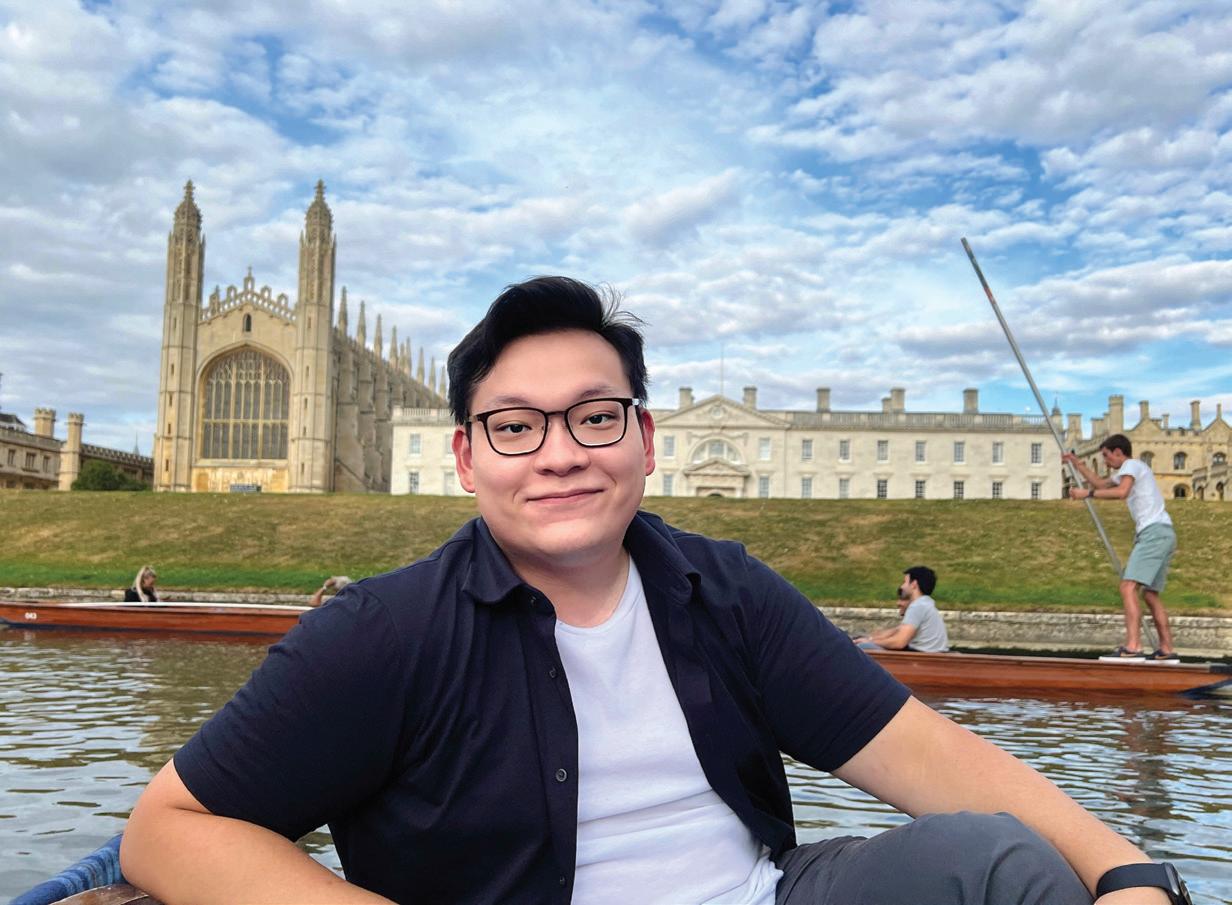
Another LT student, Lois POON Tsz-ching, who headed to University of British Columbia, Canada, also used the opportunity to make new friends across the globe. A minor cultural shock for her initially was that small talk with strangers is common among Canadians. She soon got used to it and enjoyed conversing with the locals.
The forum was wrapped up with the closing remarks by Professor Henry CHUNG, Dean of Students of CityU. He exhorted students to pursue lifelong learning beyond academics. The four-week summer programme may be a small portion of one’s university life, but the positive and far-reaching impact will not be undermined. To answer the question earlier, one can warrant that the exchange trips have transformed students into young adults with greater confidence and global vision. As the slideshows looped without ceasing, indelible marks will remain in their youthful memories.
Li enjoyed punting a lot on the River Cam in Cambridge.
ISSUE 14 | CITY CLASS 31 EVENTS
Professor David Damrosch, Founder of the Institute for World Literature (IWL), presented a certificate to Wan at the end of the IWL programme.
Empowering Students with Timely Academic English Support
Having worked in the English Language Teaching field at CityU for over 25 years, Senior Tutor Christy CHAN has been moving with the times to support university students’ academic writing. As one of the recipients of the UGC Collaborative Team Teaching Award 2021-2022, the award gives recognition to Chan’s decades-long efforts
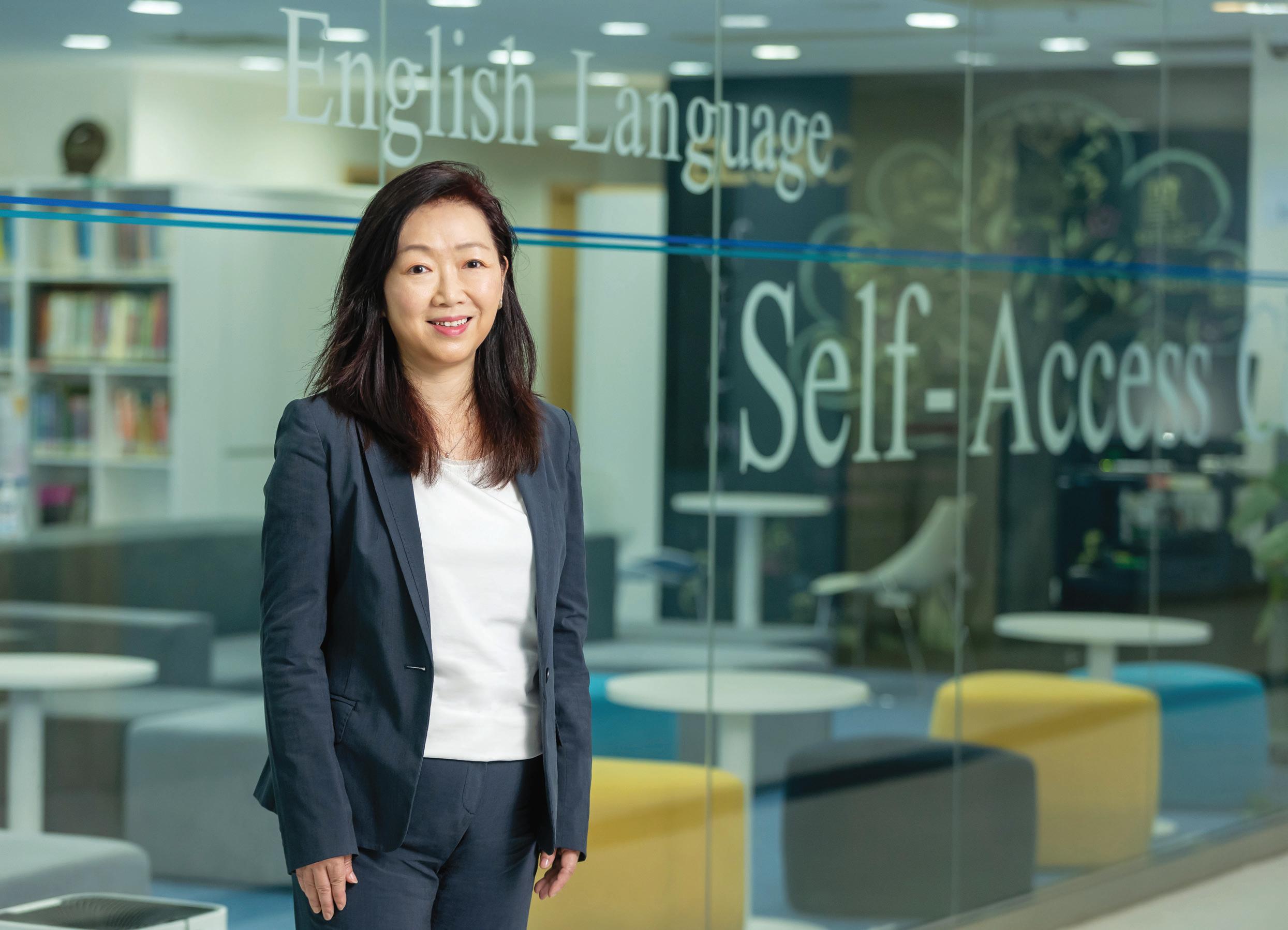
Academic success at the undergraduate level rests on several factors. One of these is being able to transfer general academic English skills to discipline-specific writing and speaking assignments. For senior-year students, this challenge is often compounded as they tend to receive less English training just when they are approaching the finishing line and about to write the most daunting piece of writing—their capstone project dissertations.
In light of this, Christy CHAN, Senior Tutor of CityU’s
Chan Feng Men-ling Chan Shuk-lin Language Centre (LC) has been at the forefront of co-leading an English Across the Curriculum (EAC) team with experienced English educators from several Hong Kong universities to provide additional English training and resources to senior-year undergraduates.
“With the growth of research areas and trends, English professionals should keep up with the pace of academia by analysing the evolving genres and preparing students for their academic
32 CITY CLASS | ISSUE 14 TEACHING & LEARNING
Chan’s work with the Language Centre, and the English Across the Curriculum team provides crucial language support to students.
needs. One example is the increasing use of simulation in science research. A lot of final-year science students are expected to selflearn the programming packages, apply them in data analysis and report the results and implications. The challenge often comes in the communication of interdisciplinary knowledge of pure science and computer science in concise academic English,” Chan explains.
Chan notes that students tend to struggle in the area of communication especially if they do not come from strong Englishspeaking backgrounds. LC and the EAC team are therefore crucial in bridging the gap.
“When we look at the curriculum, English courses are often mandated in freshman and sophomore years but not in senior year when the students need to write their dissertations; there’s a missing gap,” she explains. “Except for very few departments that offer credit-bearing courses on dissertation writing, most of the others would prefer ad hoc English support such as workshops or selflearning resources for their final-year students.”
Being Professional and Visionary
However, filling this gap has not been the only driving force behind Chan’s over two-decade long career—she embraces every opportunity to apply her knowledge of language and linguistics into supporting CityU students.
“At LC, I could try many different things because we’re supporting the entire university’s English, so I have the chance to develop university writing courses at both undergraduate and postgraduate levels, and provide language support for dissertation writing, scholarship application, and CityU talents,” she says.
Indeed, Chan started off studying English literature and French, but soon found a new passion in applied linguistics and education during her postgraduate studies in Australia, which eventually carved out her career path in higher education.
“I knew I wanted to teach, but didn’t want to regret going into the teaching field without trying anything else out. I had worked in copyright industry, but soon found that was not my field or calling,” she recalls. That’s when she pursued her two master’s degrees in applied linguistics and English literature before eventually joining CityU.
One of her roles within LC is coordinating English support for final-year science and engineering students. Chan explains that there were few relevant teaching resources back in the old days; so she analysed research articles to identify the structure and language conventions of different academic disciplines. This work ignited a passion in her.
“I feel really interested in research trends and communication, and I feel there is a need to help students,” she adds.
Inter-Institutional Project
Indeed, student support has been the basis of the EAC team’s initiative to enhance university English curriculum. To date, the initiative contains two main features: offering timely, tailor-made and targeted discipline-specific English learning materials, and creating synergy and opportunities for collaborations between English and discipline teachers.
So far, the EAC team’s work has reached over 30 departments, 60 courses, 100 teachers and 10,000 students across four local
universities including The Hong Kong Polytechnic University, City University of Hong Kong, Hong Kong Baptist University and The Hong Kong University of Science and Technology.
The team won the UGC Collaborative Team Teaching Award 2021-2022, in recognition of its outstanding efforts. This is the fourth time that CLASS faculty members have been honoured since the award’s inception in 2011. The project also won Silver in the prestigious Wharton-QS Reimagine Education Award 2022 under the category of Breakthrough Technology Innovation in Education Award.
With a quiet demeanour, Chan says she feels humbled by the award and that the programme’s success is really down to the collaborative efforts among the partner universities. Having more than 20 years of university teaching experience, all the team members have a good understanding of how to supplement the curriculum by bringing individual bountiful expertise to the table.
“Our team excels in sharing and embracing different ideas, and working with very tight deadlines beyond the call of duty,” she says.
Even during difficult times when face-to-face learning was suspended, the EAC team sprang to innovatively develop a first-ofits-kind interactive mobile app called Capstone Ninja, which is now adopted by universities in Japan, South Korea and China.
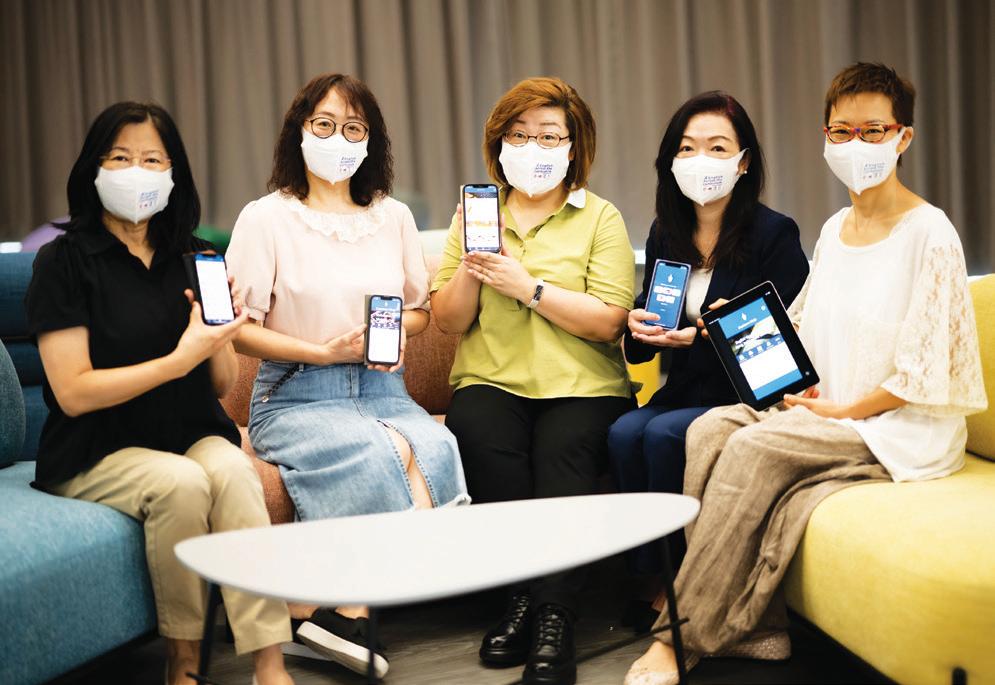
The app incorporates English learning modules and bite-sized exercises and quizzes that allow undergraduates to access disciplinespecific and customised learning materials in real time to help them complete their capstone projects.
The Road Ahead
Chan is not ready to take a back seat yet. The team is thinking ahead and planning on a new language project.
“With the UGC teaching award grant, we want to research current and new genres for the dissemination of research findings to different audiences and in multi-modal ways”, Chan says. “For example, science and engineering students may report research findings in popular science magazines or showcase it in videos.
“CityU is at the forefront of many new subjects. We have veterinary science, AI in manufacturing, aerospace engineering, and English teaching should keep pace with this evolving world.”
The EAC team developed an interactive mobile app called Capstone Ninja, which has received positive feedback from teachers and students.
ISSUE 14 | CITY CLASS 33 TEACHING & LEARNING
Dr Cui Wendong (right) and Mr Pao Kwok-hung co-presented the second session virtually, joined by Dr Chan Hok-yin (left), the Associate Head of CAH.
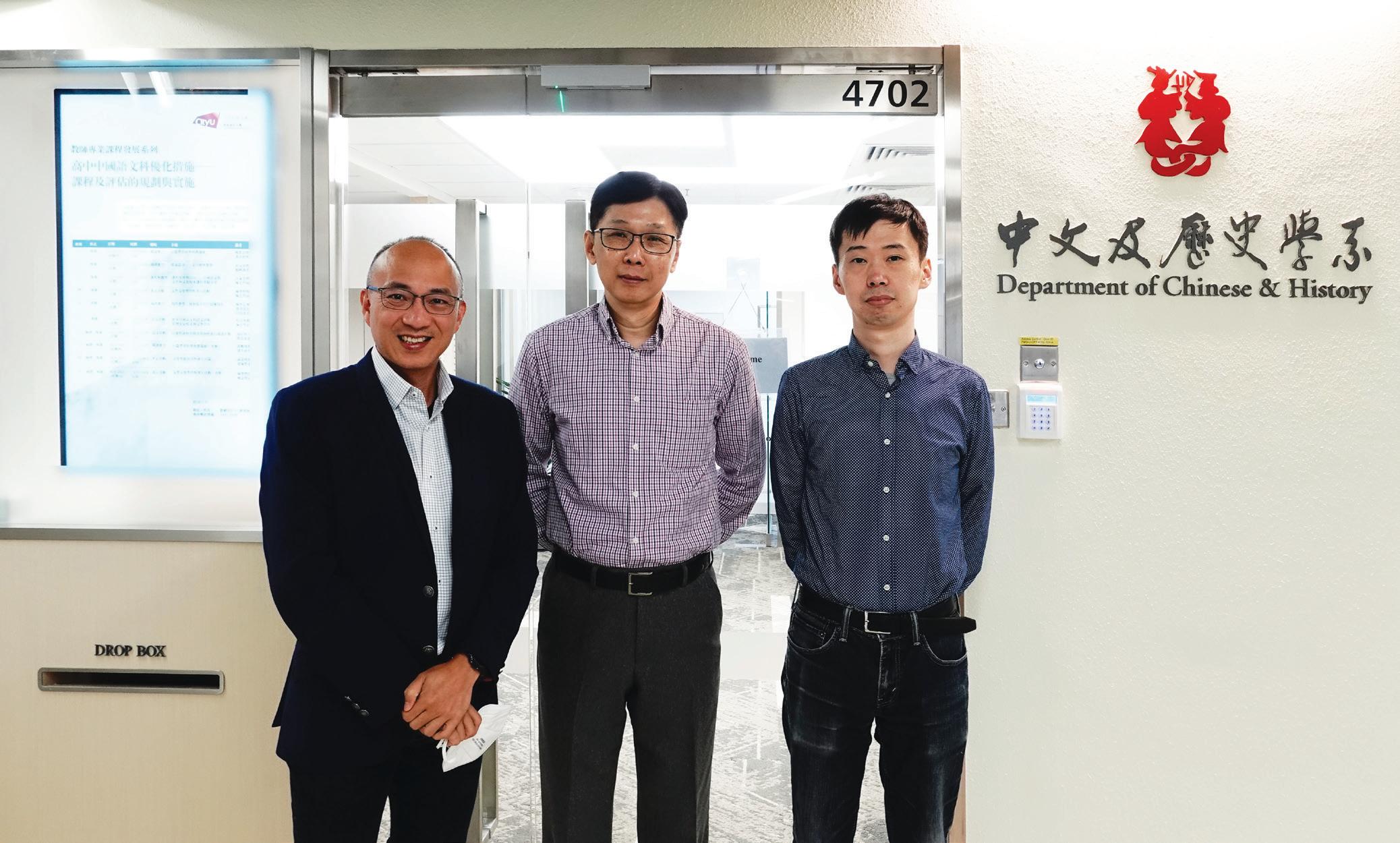
Learning without Satiety
Educators are often illustrated as a drizzle in spring for their gentle but impactful contribution to educating students. Despite the drastic changes in the education sector, most teachers stay the course and persist in their duties. As they remain devoted to nurturing young minds, who will tend the nurturers, one can’t help but wonder? Scholars from City University of Hong Kong (CityU) are ready to come to the aid of local educators who long for professional enrichment, refreshing and empowering them with new pedagogy and subject-based knowledge.
As the government initiates refinement in the new senior secondary curricula in 2024, it has heralded a new direction for the professional development of local teachers. Commissioned by the Education Bureau (EDB), CAH has rolled out the Teacher Professional Development Course Series (TPDCS) for Chinese Language teachers from local secondary schools since 2021. It was well-regarded by 1,616 participating teachers and received recognition from the EDB in the first year.
CAH does not rest on its laurels. The department is further scaling up TPDCS, launching another round from October 2022 to June 2023 to deliver 10 three-hour courses that expound on planning and implementing curriculum and assessment at senior secondary schools.
Experts on Board
Powered by the faculty’s erudition in their research areas, the Department Head Professor CHING May-bo, Professor KWOK Pang-fei, Dr CHAN Hok-yin, Dr CUI Wendong, Dr LING Chao, Dr LU Chia-hui, Dr LAM Hok-chung, and Dr LO Kar-kee team up with six other veteran teachers from various secondary schools. The team of experts enables knowledge transfer from academia to local schools. It echoes the EDB’s objective that calls for more professional and scholarly input to the education sector.
Added to the comprehensiveness of TPDCS is the pairing of instructors. From the instructional design to the course delivery, the project team strategically integrates scholars’ expertise and
Scholars of CityU’s Department of Chinese and History (CAH) team up with six veteran teachers to deliver a string of professional development courses for Chinese Language teachers from local secondary schools
34 CITY CLASS | ISSUE 14 TEACHING & LEARNING
hands-on experiences in teaching. Each session will be conducted by a duo of a scholar and a teacher to facilitate the participants’ holistic understanding of theoretical and practical knowledge.
Extensive Topics
Topics of Teacher Professional Development Course Series 2022/23
Activity: From Historical Memories to Creative Writing Prof CHING May-bo Mr CHAN Chi-kian 14 March 2023 A Walkthrough of Language Activities with Quality Readings Dr LING Chao Ms TSANG Tsz-wun 20 April 2023
A Pedagogical Strategy: From Passages to Book (Rerun)
Prof KWOK Pang-fei Dr POON Po-chiu 19 May 2023 Special Topics in Culture and Classroom Discussion Dr LO Kar-kee Ms LEUNG She-kwan 9 June 2023 Diversified Activities for Learning Chinese Literature and Culture (Rerun) Dr Chan Hok-yin Mr CHAN Chi-kian
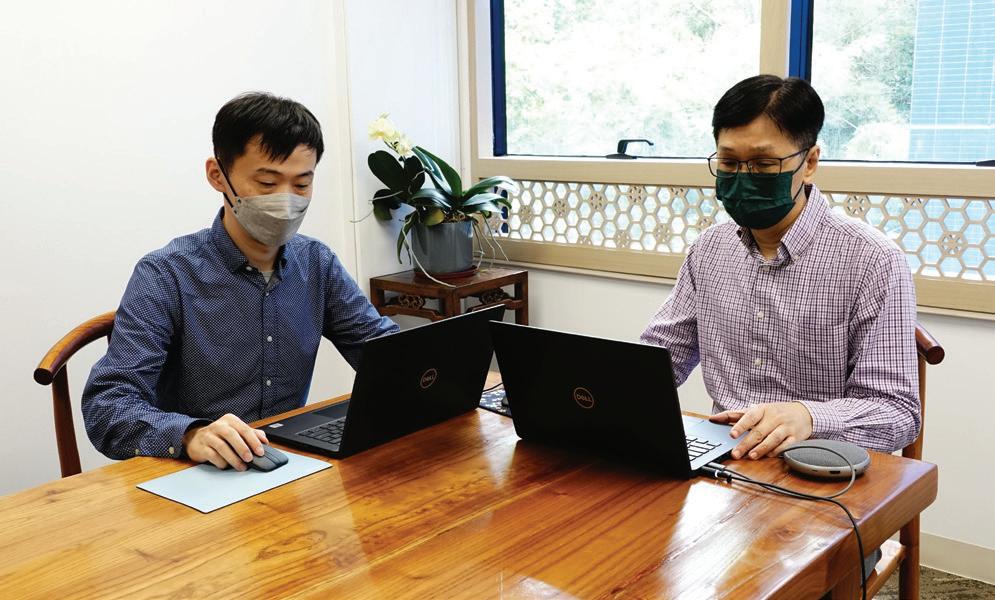
Wholesome Rewards
With professional guidance from the project team, the participating teachers will tune into the optimisation of the Chinese Language curriculum at senior secondary schools, soaking up teaching skills and subject-based knowledge in the key learning area. TPDCS provides valuable resources that pave the way for further applications of Chinese Language teaching in a classroom.
The reward is not exclusive to the participants. Since the veteran teachers share their successful examples of implementation, it enables them to capture and consolidate the knowledge and experience gained, followed by disseminating the good practices to a broader community of teaching professionals. Eventually, such enhancement of teaching will nourish the learners.
It is expected that over 2,000 Chinese Language teachers will benefit from the courses, with an average of 200 attendees per
session. All secondary school teachers, students and the public can also access the course materials on the EDB’s website anytime.
In-service participants have solid teaching experience and their own perceptions of pedagogy. They are eager to learn how frontliners can put the wisdom into practice and carry out the methodologies. Consequently, TPDCS encompasses sundry facets of Chinese Language pedagogy, such as curriculum planning, school-based assessment, teaching strategies, composition writing, guided reading, special topics in culture, and language learning activities. Browse CAH’s website to learn more about the Teacher Professional Development Course Series
After all, learning is an ongoing journey that may wear one out from time to time, especially for teachers who are swamped with daily tasks. As the saying goes, “The silent treasuring of knowledge, learning without satiety, and instructing others without being wearied.” These sage remarks, imparted by Confucius centuries ago, still carry much wisdom today. May the apothegm kindle the zest in educators who unceasingly absorb professional knowledge for betterment.
Date Topic CAH Speaker Teacher-speaker 20 October 2022 A Pedagogical Strategy: From Passages to Book Dr LAM Hok-chung Dr POON Po-chiu 7 November 2022 Recommended Passages—Classics of Literary and Colloquial Readings Dr CUI Wendong Mr PAO Kwok-hung 23 November 2022 Curriculum Planning and Design: School-based Curriculum of Chinese Literature and Culture in Chinese Language Subject Dr LU Chia-hui Mr CHAN Chi-kian 14 December 2022 Diversified Activities for Learning Chinese Literature and Culture Dr CHAN Hok-yin Mr CHAN Chi-kian 9 January 2023 The Teaching of Composition: How to Refine Writing in Daily Life Dr LAM Hok-chung Ms TSANG Tsz-wun & Ms CHONG Yiu-man 4 February 2023 Chinese Language School-based
CAH's Cui (left) and Pao (right) unfolded the pedagogy of literary and colloquial readings virtually.
ISSUE 14 | CITY CLASS 35 TEACHING & LEARNING
Finding an EQ equilibrium
Filled with gratitude, Frederick POON Siu-chi feels lucky to have encountered good teachers in his youthful days, inspiring him not only academically but also personally. His formative experience at CityU has paved the way for a career in education—and ignited a determination to nurture future talents for Hong Kong
From an early age, Frederick POON Siu-chi always knew he wanted to be a teacher and enter the field of education. Now
Principal at St Paul’s Co-educational College, Poon was fueled by a desire to spark passion in others, the same way he was inspired by two of his mathematics teachers during junior school.
“Those two teachers not only taught me maths, they also taught me how to be a good person and to have wisdom. They taught me that education is fundamental to the development and growth of teenagers,” Poon said.
For this reason, when the time came for him to kickstart his career, Poon knew he wanted to earn a degree in Education. “I told myself I would like to be a teacher. That was my aim, so I had to find a course that would help me to do that,” he said.
At the time, City University of Hong Kong (CityU) was offering a BA in teaching English as a second language, and Poon decided to take up this subject because of his experience at his alma mater, St Paul’s College.
It was there that his old English teacher had encouraged him and his fellow students to read the South China Morning Post’s Young Post supplement every day in order to build up a solid foundation in English. “That’s how I got interested in English and why I chose to do my BA in English at CityU,” he said.
Passing on the Torch
The years that followed at CityU proved to be an incredibly valuable time for Poon as the courses he embarked on and the lectures he attended helped to refine his career goals. In particular, he recalls how his lecturers would share their experiences of working as secondary school teachers before they joined the University. They would explain how they dealt with different situations, providing insight into what it takes to be a good teacher.
Poon said the beauty of having both foreign and local lecturers was in hearing different perspectives on how different cultures deal with various issues in a classroom.
Following his bachelor’s, Poon continued to study, earning a Postgraduate Certificate in Education and then an MA in teaching English as a second language. As he began to become more interested in administration, he eventually did a second MA, in Educational Administration, years later. In all, Poon became extremely passionate in working with teenagers with the hope of instilling the same sense of humanity and curiosity as his teachers had done for him.
In 2017, he became the head of one of Hong Kong’s prestigious schools—St Paul’s Co-educational College.
In this current role, Poon is adamant that students live and breathe the school’s age-old values and its motto of embracing faith, hope and love in all that they do. He believes that the well-being of teenagers is intrinsically tied to these and to getting a good education.
In order to do this, Poon believes that education should provide students with the opportunity to expand their international perspectives, train students to think critically and learn how to express themselves rationally and be able to have the good judgement to differentiate between what is right and wrong. He also believes that helping students to develop a strong EQ is important to teach them how to handle different situations. Crucially, educators have the important job of teaching students to value learning itself.
“Subject content is important, but we also have to offer many chances for them to expose themselves to any cross-curricular activities in order for them to learn to be well rounded,” he said.
Emerging Stronger from Crises
And of course, setting a good example is also important. Poon himself is a shining example of a person of resilience, wisdom and someone with
36 CITY CLASS | ISSUE 14 STUDENTS & ALUMNI
Standing in the centuryold heritage building, Poon regards the school motto "faith, hope and love" as crucial words to help nurture students to become future leaders.
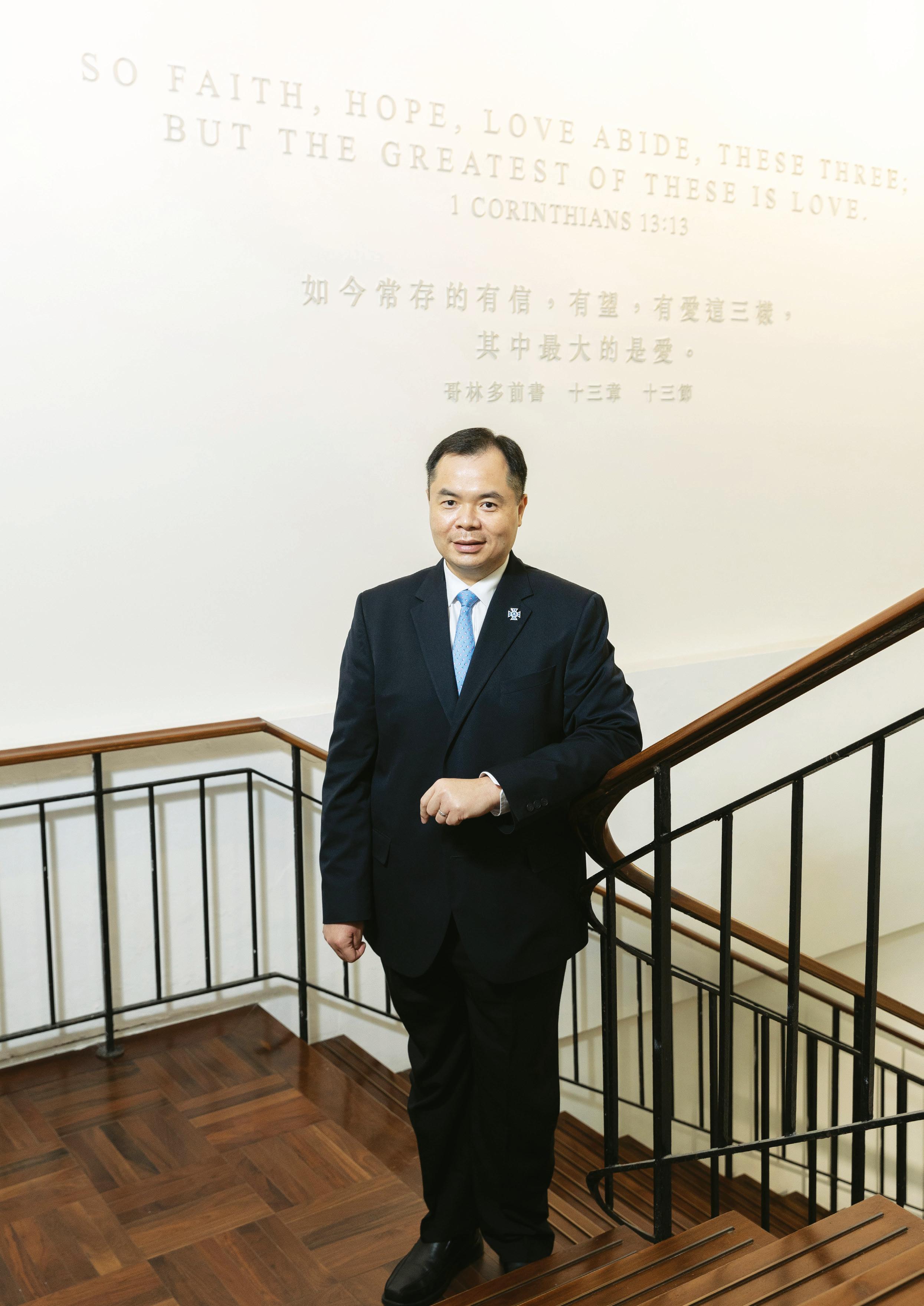
ISSUE 14 | CITY CLASS 37 STUDENTS & ALUMNI
Poon has guided St Paul’s Co-educational College through some tumultuous years, perceiving those challenges as opportunities to be learned from.
great passion. He has had the challenging job of navigating and leading the charge at the school during several tumultuous years in Hong Kong through education reform, protests and, most painstakingly, COVID-19. But rather than seeing these events as challenges, Poon saw them as opportunities.
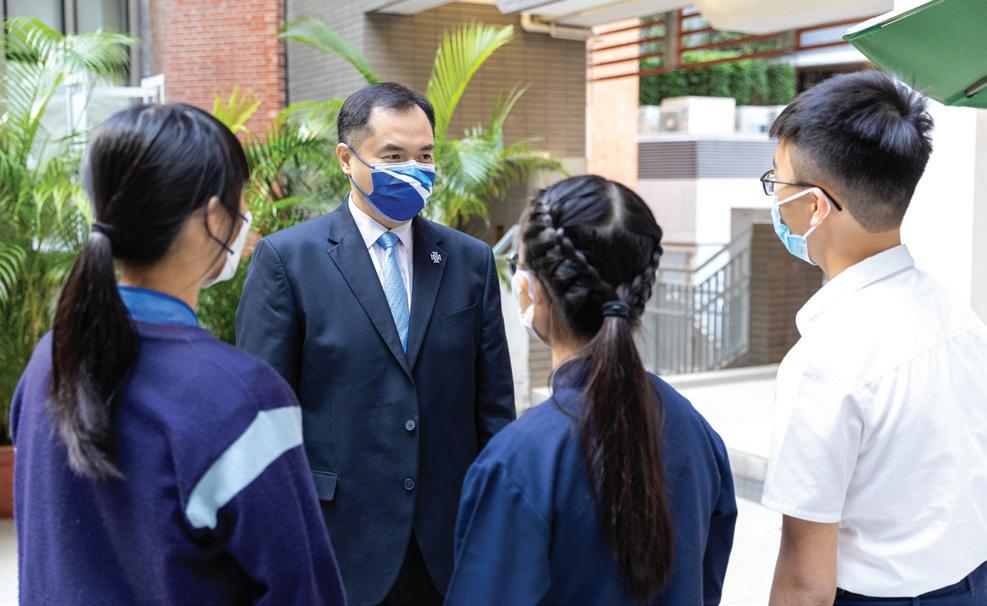
“The pandemic created new opportunities for students,” he said. “We have been adopting a blended mode of education using Zoom and meetings, and it’s given the students and teachers a new exposure to new technology.”
Recognising that there are definite pitfalls to using too much technology, Poon also sees this as an opportunity to improve the school’s values education, to teach a new generation of tech-savvy thinkers how to be critical thinkers and ethical citizens in a digital age.
“Education is significant and fundamental in preparing our new generation to face all sorts of challenges,” he said.
While this alumnus of CityU has enjoyed significant success throughout his career, he does not claim it as alone achievement. Poon is grateful for the support of his college council, his hardworking staff and his own educational experiences for his current successes. He also believes that his own personal philosophies have stood him in good stead.
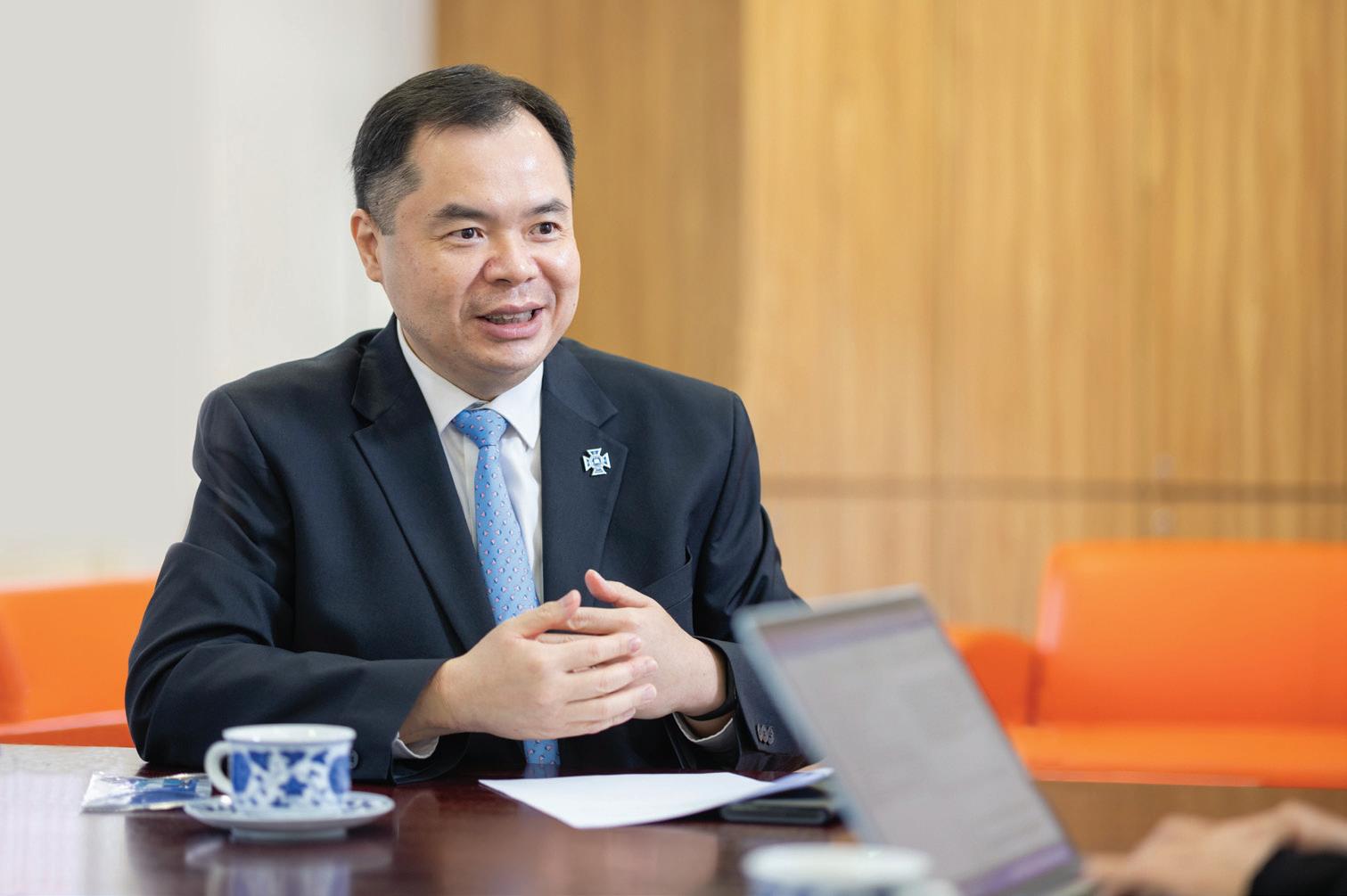
“For example, I always have to be in the know about everything that goes on in our school, no matter how big or small. This is the only way that I can get a better picture,” he said. “I talk to everyone—the students, the teachers, the janitors, all the different stakeholders to hear how they feel about the school.”
Poon’s advice for current students studying at CityU is to make good use of their time to learn as much as they can and to contribute to society. “Hong Kong is a place where East meets West and it’s a great place to train and broaden your horizons,” he said. “Always remember your alma mater and live up to the values of CityU whenever and wherever you can.”
Education is significant and fundamental in preparing our new generation to face all sorts of challenges
Frederick Poon Siu-chi
38 CITY CLASS | ISSUE 14 STUDENTS & ALUMNI
Poon chats with all members of the school, from students to janitors, to make sure their feelings and concerns are heard.



Programme information Department of Social and Behavioural Sciences ∙ Master of Arts in Applied Social Sciences ∙ Master of Social Sciences in Counselling ∙ Master of Social Sciences in Psychology ∙Master of Social Work 文學碩士(應用社會科學) 社會科學碩士(輔導學) 社會科學碩士(心理學) 社會工作碩士 ∙ Master of Arts in Chinese Department of Chinese and History 文學碩士(中文) ∙ Master of Arts in English Studies Department of English 文學碩士(英語語言) ∙ Department of Linguistics and Translation Master of Arts in Language Studies 文學碩士(語言研究) ∙ ∙ Department of Media and Communication Master of Arts in Communication and New Media Master of Arts in Integrated Marketing Communication 文學碩士(傳播與新媒體) 文學碩士(整合營銷傳播) Department of Public and International Affairs ∙ Master of Arts in Housing and Urban Management ∙ Master of Arts in International Studies ∙ Master of Arts in Public Policy and Management ∙ Master of Social Sciences in Development Studies 文學碩士(房屋及都市管理) 文學碩士(國際研究) 文學碩士(公共政策及管理) 社會科學碩士(發展研究)
The merger aims to improve productive synergy and enhance academic competitiveness.
New CLASS Department Builds Greater Synergy
CityU’s College of Liberal Arts and Social Sciences (CLASS) has merged its Department of Asian and International Studies and Department of Public Policy, to establish the new Department of Public and International Affairs (PIA), effective 1 August 2022.
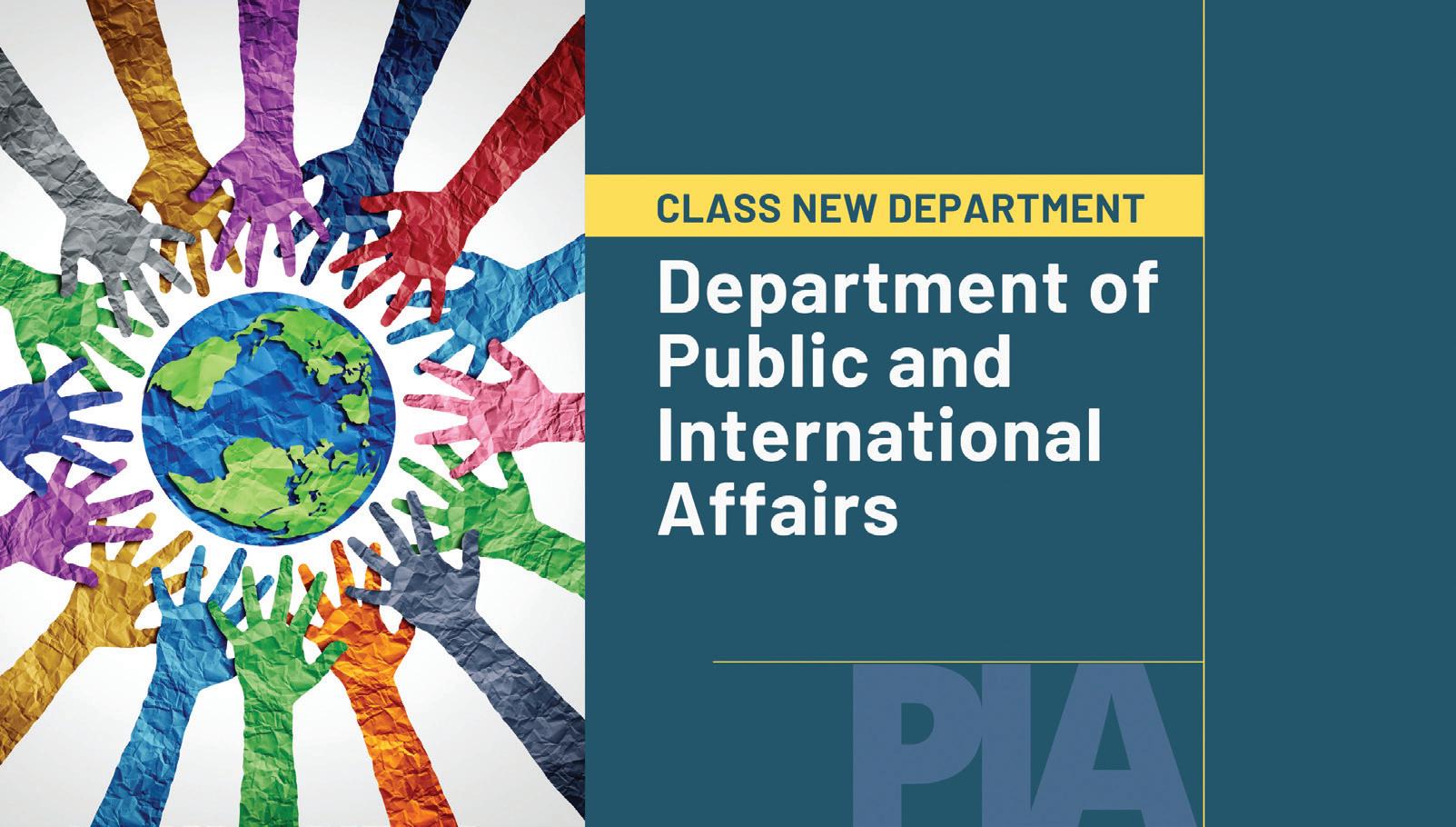
Tracing back to 1986, the Bachelor of Arts (Honours) in Public and Social Administration programme was one of the first two degree programmes established in CityU. For more than three decades, the department had moved with the times to offer various undergraduate and postgraduate programmes, aiming to equip students with broad and in-depth knowledge to meet the challenges brought by the everchanging world, and be more competitive in different situations.
Today, by bringing over 40 faculty members from the two former departments under one roof, the merger is envisaged to augment productive synergy and enhance academic competitiveness. Dean of CLASS Professor Richard M WALKER has great aspirations for this new milestone, hoping the one-of-a-kind department in Hong Kong will further inspire interdisciplinary collaborations in the college and across the campus, leading the way in professional education and research and societal impact.
Professor Alfred HO, the Department Head of PIA, believes the new department will make a broader, more visible and more
meaningful impact. It is expected that the new department will conduct cutting-edge interdisciplinary research on development, international relations and comparative governance, politics, public and non-profit management, urban management and development, and public policy, and has particular expertise in the study of Hong Kong, the Greater Bay Area, China, and East and Southeast Asia.
Living in this rapidly changing world, it is crucial for students to apply what they have gained in their university life to make a difference to the world, tackle the societal challenges head-on, and contribute to the betterment of society. By providing students more diversified coursework options, experiential learning opportunities and international study experience, PIA will give students a vibrant academic environment to guide them to think critically and creatively about local, regional and global policy challenges, so as to dissect problems and recommend societal improvements.
Visit the new Department’s website to learn more
40 CITY CLASS | ISSUE 14 NEWS
New Research Cluster Links Neuroscience and Information Technologies
Human brains serve many important functions, including being the seat of consciousness and the unconscious; locus of control of language and creativity; motor of knowledge, memory, judgment and problem-solving; regulator of movement and emotion as well as processor of sense perception. New knowledge about the relationship between the structure, activity and functions of the human brain, and human cognition, emotion and behaviour are crucial to improve human well-being and mental health across one’s lifespan.
The College of Liberal Arts and Social Sciences (CLASS) of CityU endeavours to cultivate interdisciplinary education and cutting-edge research to solve the challenges facing the world. After the establishment of the three research clusters, namely One Health, Digital Society and Smart City, CLASS has announced the establishment of its fourth research cluster, Brain, which focuses on studying the human brain and its impact on affective, behavioural and cognitive functions. The new Brain cluster gathers researchers in the fields of not only humanities and social sciences, but also neuroscience, computer science and information technology to develop a better understanding of the human brain.
On 18 and 19 May 2022, the Department of Media and Communication (COM), together with CLASS, co-hosted the inaugural Brain research cluster online symposium featuring 19 moderators and speakers. Dean of CLASS Professor Richard M WALKER welcomed the participants and kicked off the online symposium. He was delighted to announce the establishment of a new research cluster to bring people to the new initiative and focus on studying the human brain. He also explained the motivations behind creating this cluster, hoping to solicit multiple forces across the faculty to help solve global problems and challenges.
Next, Professor Fiona NAH Fui-hoon of COM, Convenor of the Brain cluster, introduced the new cluster and its members, and the topic and schedule of each session in the two-day symposium. The topics included neural understanding of language, neural mechanisms of mindfulness, neural mechanisms of psychological flow, visual
attention across the human lifespan, and functional brain networks. Roundtable discussions were arranged at the end of Day 1 and 2 for CityU faculty members, students and potential collaborators to exchange ideas on research needs, interests and potential collaborations. The symposium was attended by 180 participants. The online symposium showcased the fruitful research findings of local and international scholars from prominent institutions around the world on the study of the human brain, and presented the application of advanced technology and knowledge in the fields of linguistics and languages, communication and media, psychology, and cognitive neuroscience.
View more information about CLASS Brain research cluster
The Brain research cluster studies the human brain and its impact on affective, behavioural and cognitive functions.
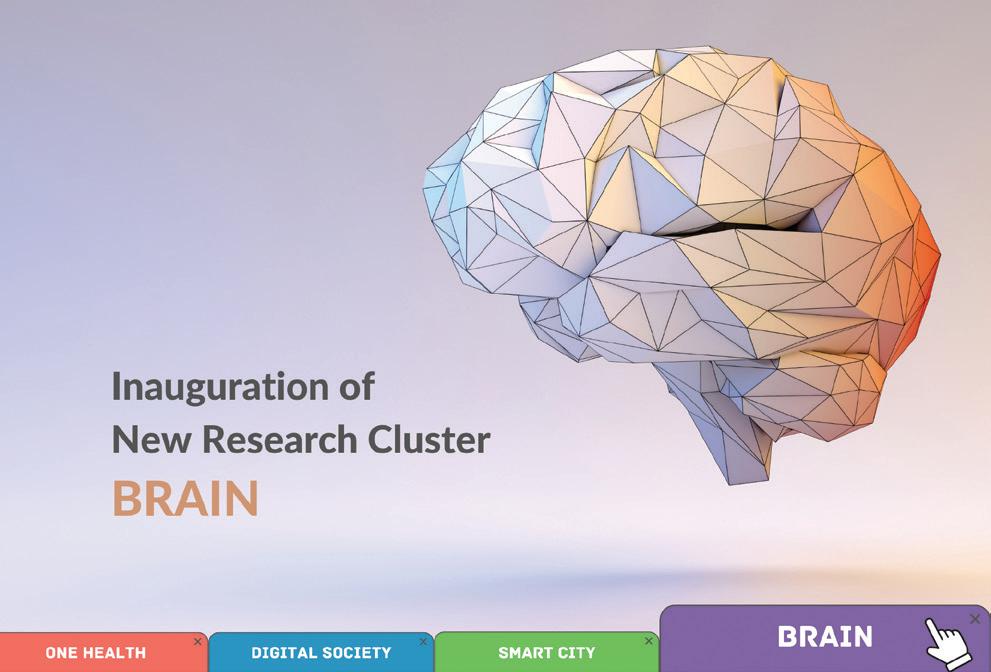
ISSUE 14 | CITY CLASS 41 NEWS
Illuminating the Life of a Lighthouse Keeper –“Lighthouses: Paradise Beyond the City”
To most city dwellers, lighthouses seem esoteric. Erected along the shoreline, a lighthouse is more than just a tower blinking at the sea; it is also a structure that carries many memories of the coastal community. Like the untold stories of Charles THIRLWELL (19181985). He was a Hong Kongborn British lighthouse keeper on isolated islands and known as the “Father of the Fishermen” for his dedication to the indigenous fisherfolk. To preserve the almost forgotten history, the Lighthouse Heritage Research Connections Project of City University of Hong Kong (CityU) and Hong Kong Maritime Museum co-organised an exhibition and seminar titled “Lighthouses: Paradise Beyond the City” on 22 May 2022.
First, the exhibition showcased images of historical newspapers, photos and paintings drawn by Thirlwell, narrating the lighthouse keeper’s life and work, as well as his friendship with the local fisherfolks. CityU’s students turned into avid docents and provided guided tours to the guests.
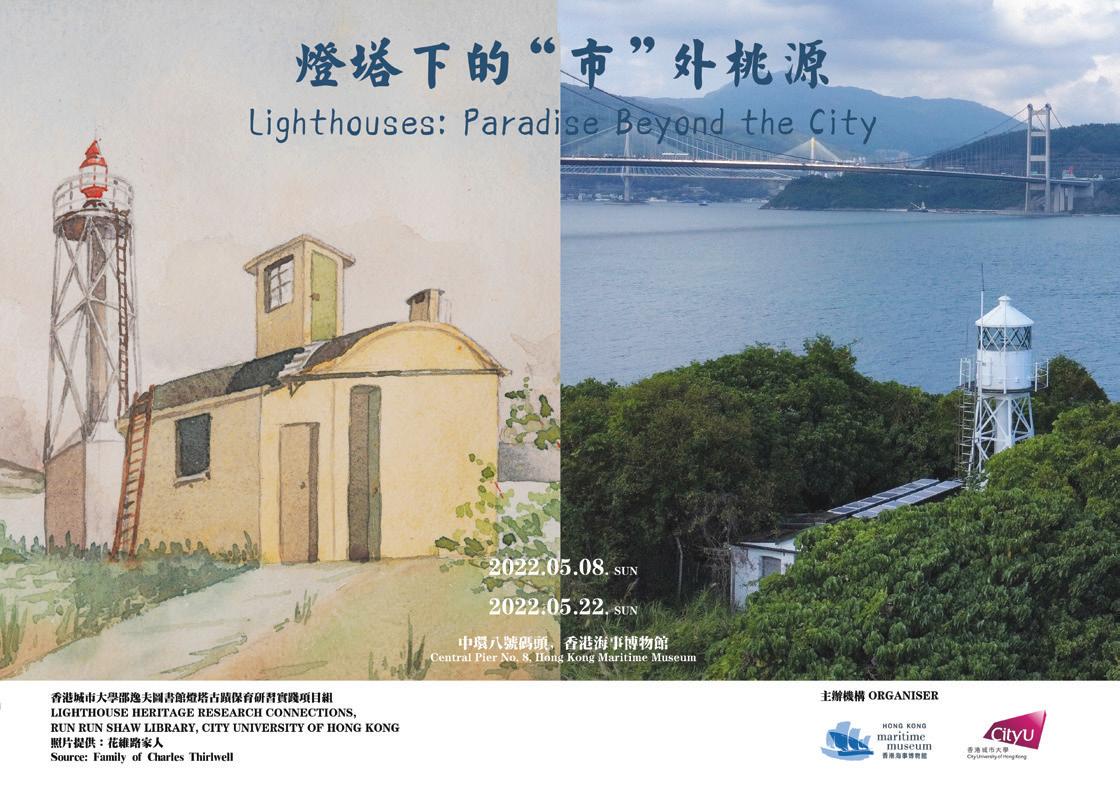
After the guided tour, the seminar began in the afternoon with Professor KIT Chunyu, Acting Head of Department of Linguistics and Translation (LT), delivering one of the opening remarks.
Dr Jennifer CHEUNG Chui-yiu JP, Founding President of the Association of China Trend Studies (HK) and a member of the CityU Court, also gave a written address in the opening session.
Thirlwell’s family and local fisherfolk gathered at the seminar to recount their sentiments, stories and bonds with the lighthouse keeper. Better still, the assemblage of recollections gave valuable substance to the seminar, enriching the nub of the event. Under the tutelage of the faculty members, students from the Department of Media and Communication, Chinese and History, LT, and Architecture and Civil Engineering also contributed their expertise to the lighthouse heritage studies at the event. Such creativity manifested in their riveting works of braille books, audio descriptions, documentaries, multi-lingual narratives, case studies, simultaneous interpretation, and 3D model reconstruction.
Both the exhibition and seminar were full of remnants, collages, and nuances rendering a biography of the lighthouse keeper’s lifelong profession. The passage of time may overtake the lighthouses but the memories around them will linger as the past, present and future were inextricably linked by all the efforts in making the event.
42 CITY CLASS | ISSUE 14 NEWS
CityU and Hong Kong Maritime Museum co-organised an exhibition and seminar about the late lighthouse keeper Charles Thirlwell.
Taster Lectures for Tomorrow’s Talent
“W
hat should I do after graduation?” is a common question among secondary school students. They are encouraged to follow their heart in search of their aspirations. Sometimes there are too many options, though. Knowing the need of the prospective students, CityU’s College of Liberal Arts and Social Sciences (CLASS) set out to offer taster lectures and activities as a teaser of university education. From July 2022, senior students and teachers from local secondary schools visited CityU to attend taster lectures and facility tours held by CLASS. Participating schools included Ma On Shan Tsung Tsin Secondary School, King Ling College and Yuen Long Merchants Association Secondary School.
In the taster lectures, the prospective students were introduced to various disciplines, such as Psychology, Criminology, Linguistics and Communication, through engaging and interactive activities. Thanks to Dr Dannii YEUNG, Dr Rebecca WONG, Dr Caesar LUN and Dr Nancy DAI for unfolding their professional and scholarly wisdom. Then, an admission talk was delivered in which the attendees could
learn about the programme options, entrance requirements, multiple study pathways and exchange opportunities. The plethora of learning experiences will guarantee students the flexibility to forge their own path at CLASS.
There was more to be explored outside the lecture hall.
Professor LIU Yu-li, Head of the Department of Media and Communication (COM), greeted the students before the facility tour. Guided by COM representatives, the group toured the Run Run Shaw Creative Media Centre to check out the learning facilities for media production, including the Omnimedia Digital Newsroom, 3D Virtual TV Studio, and Advertising Design and Shooting Studio.
The taster programme empowers prospective students to envision themselves at CityU CLASS, where they can create a bond by literally traversing the campus and taking in the vibrant atmosphere. Instead of just being told about the options available, they can leverage the first-hand experience to visualise the magnitude of university life before they decide what to study out of their own volition.
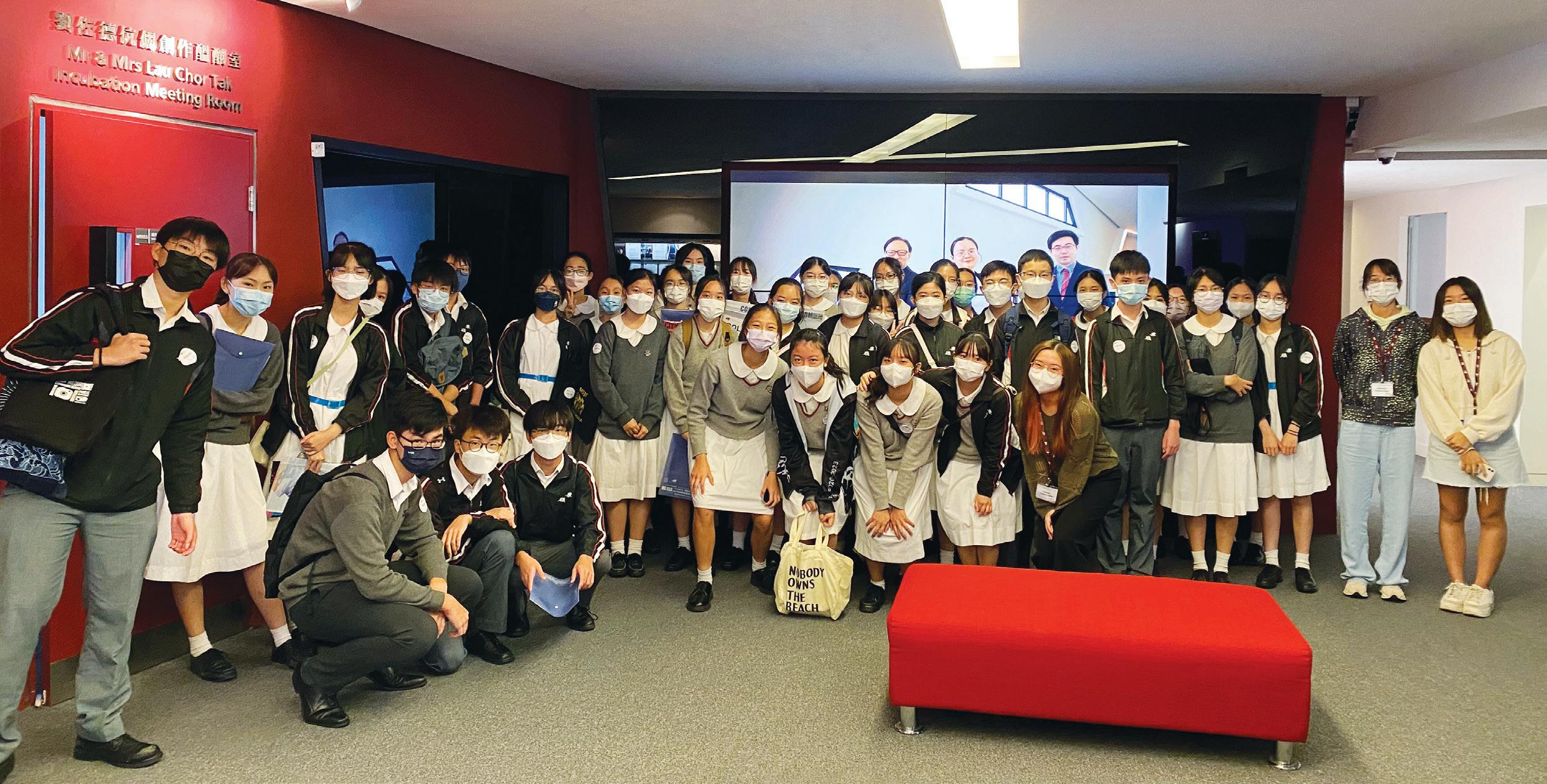
ISSUE 14 | CITY CLASS 43 NEWS
CLASS organises taster lectures and activities to give secondary school students a glimpse of university education.
Dean: Professor Richard M WALKER
Director of Administration: Dr Hermia CHIU Po-hing Production: College Publicity Team
CITY CLASS connects the College of Liberal Arts and Social Sciences (CLASS) with our stakeholders. The magazine offers a snapshot of CLASS events and achievements in areas such as teaching, research, knowledge transfer, student activities, learning experiences, and university life. It aims at providing readers with insights into the College’s commitment to quality education and research.
Online version is available on www.cityu.edu.hk/class/magazine To subscribe to the magazine, please send an email to: ch.publicity@cityu.edu.hk ©2023 College of Liberal Arts and Social Sciences, City University of Hong Kong CLASS.CityU cityu.class















































